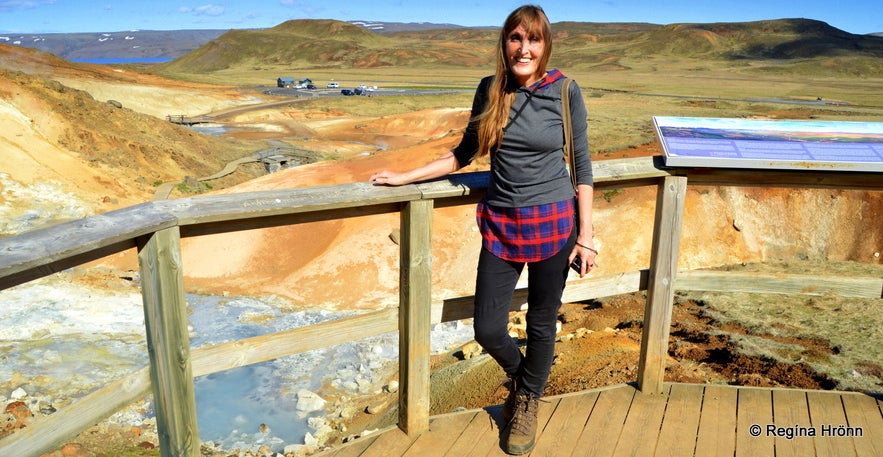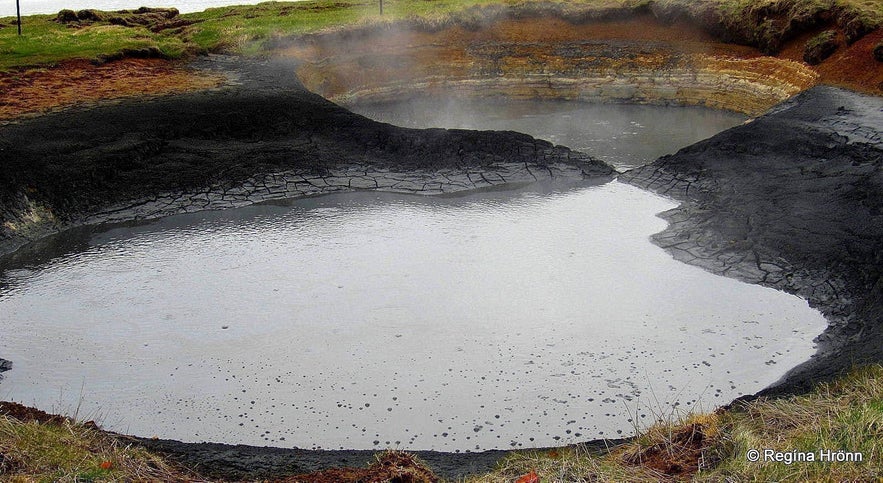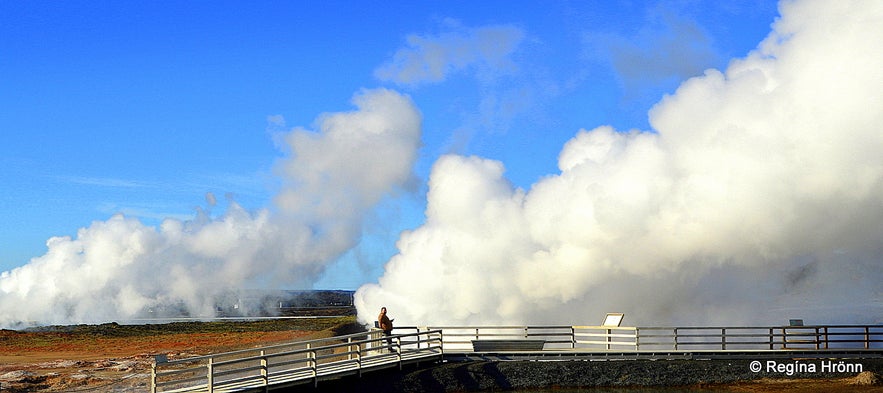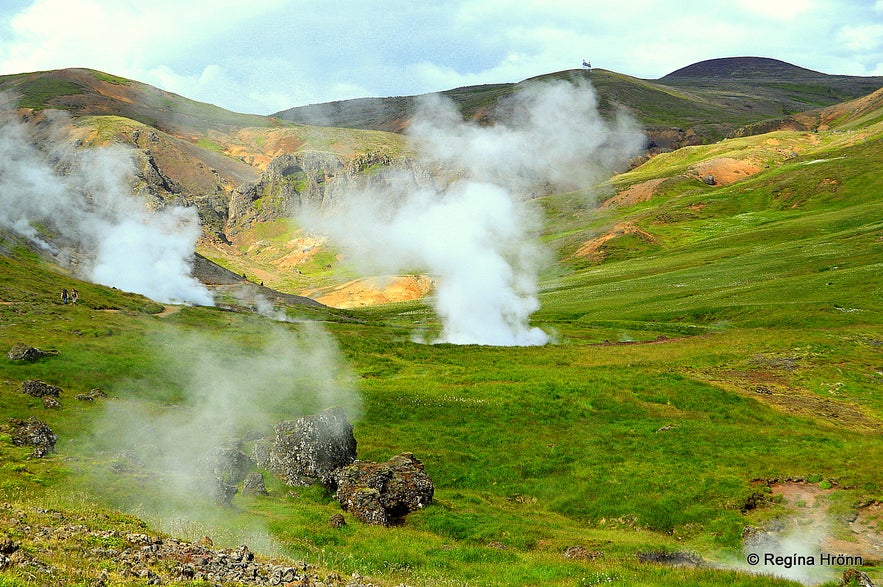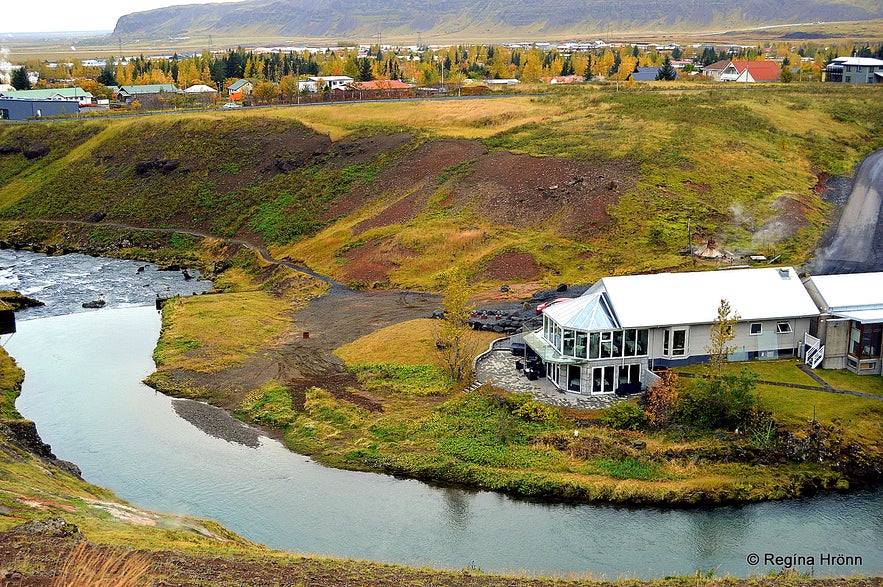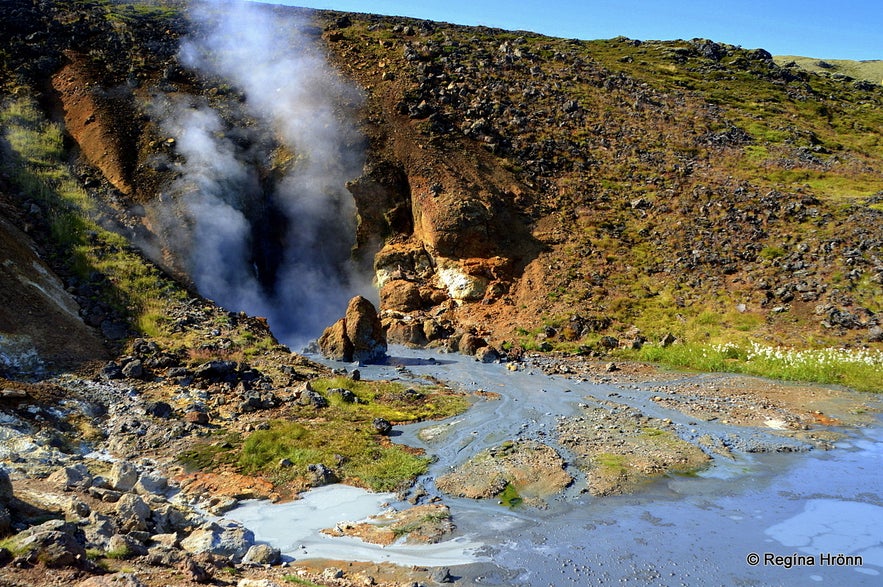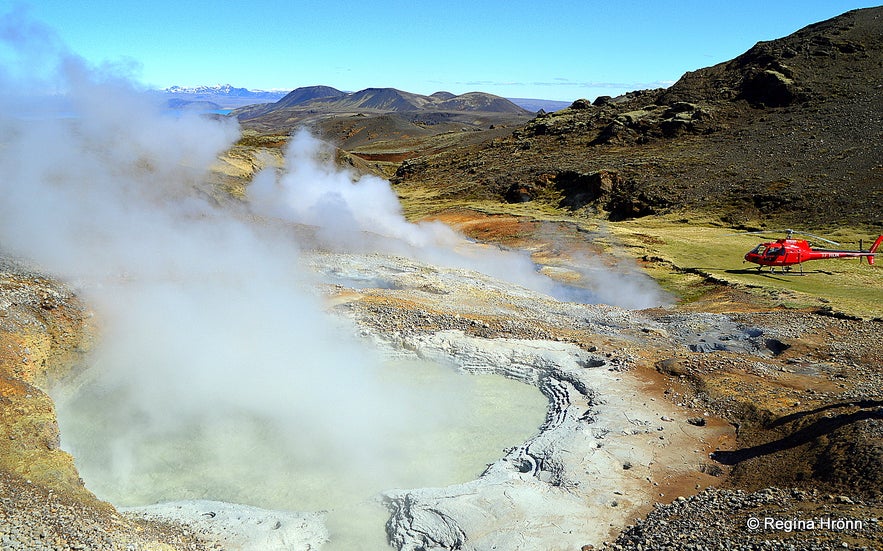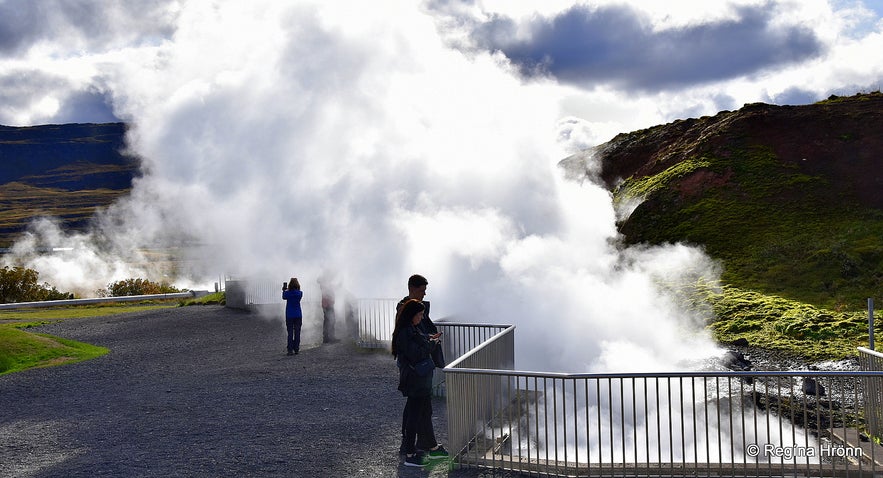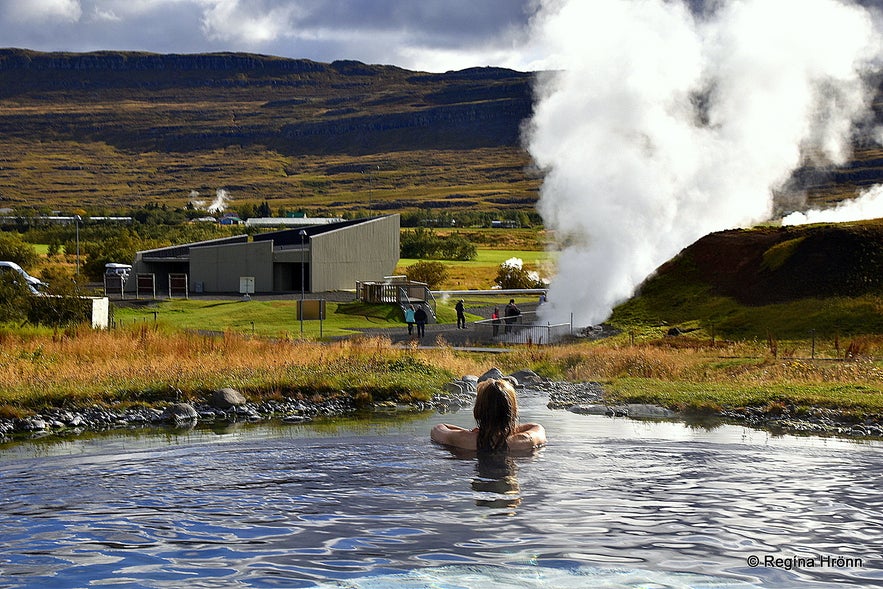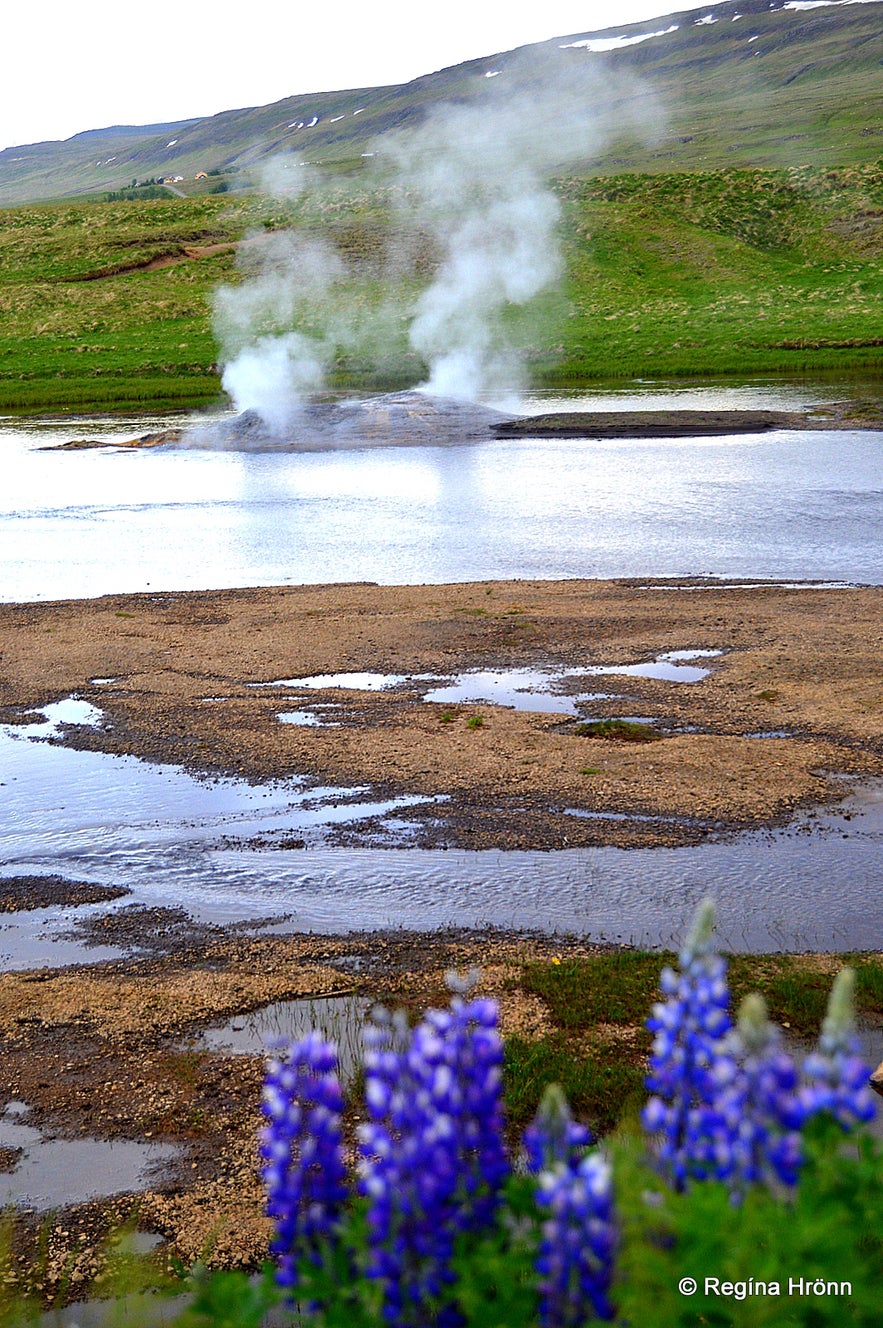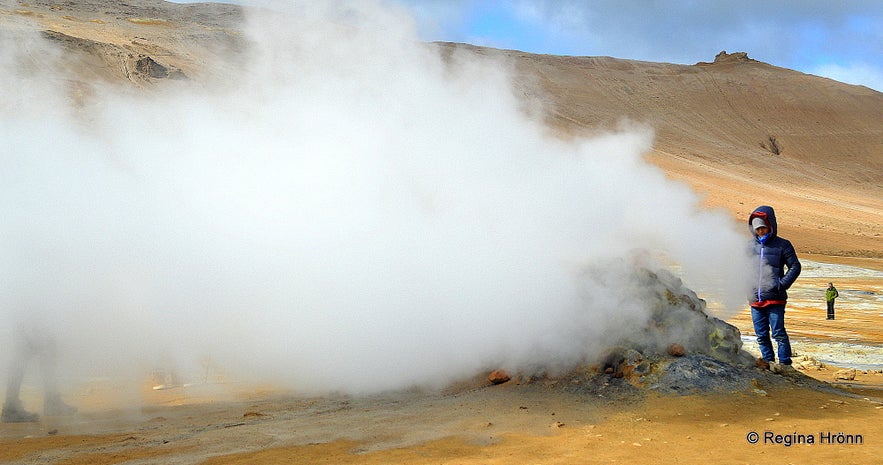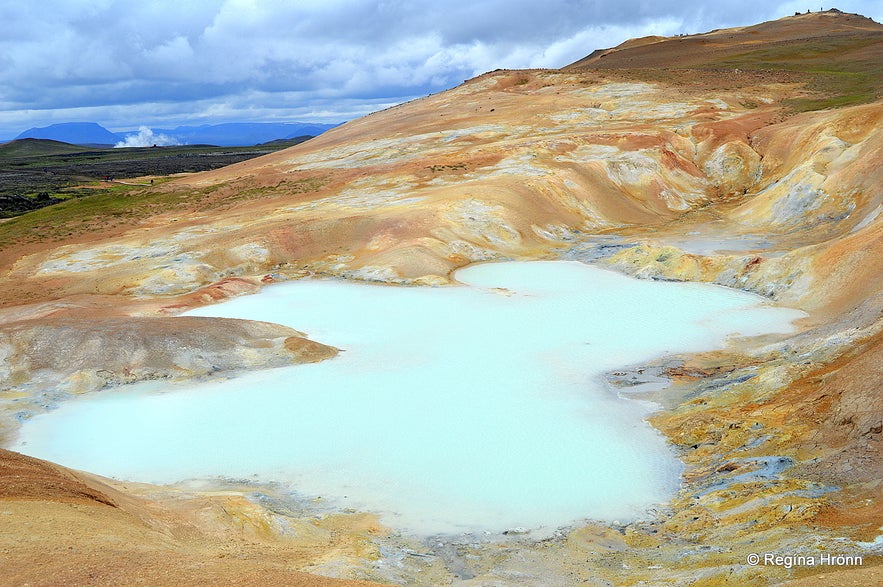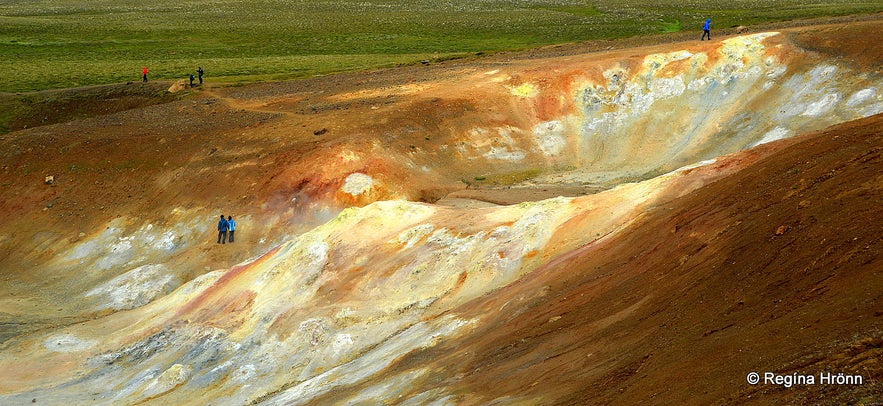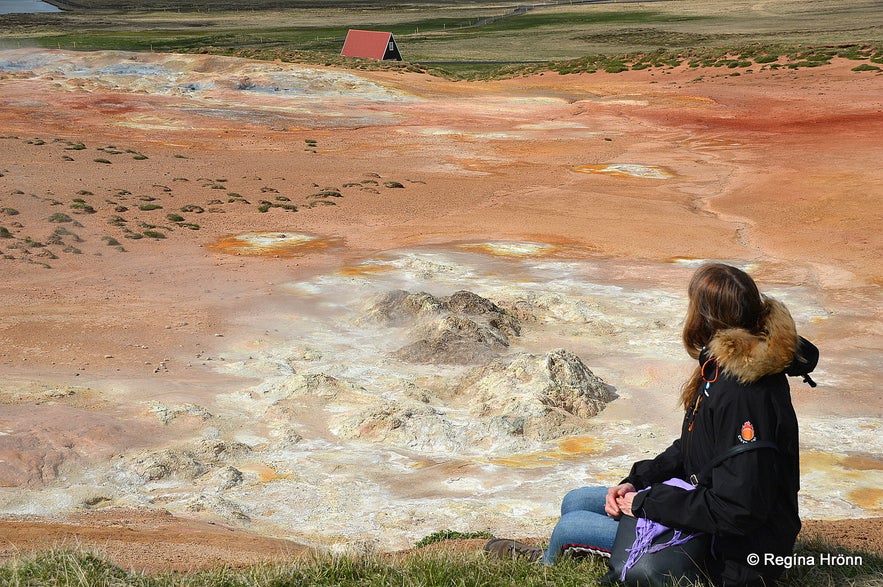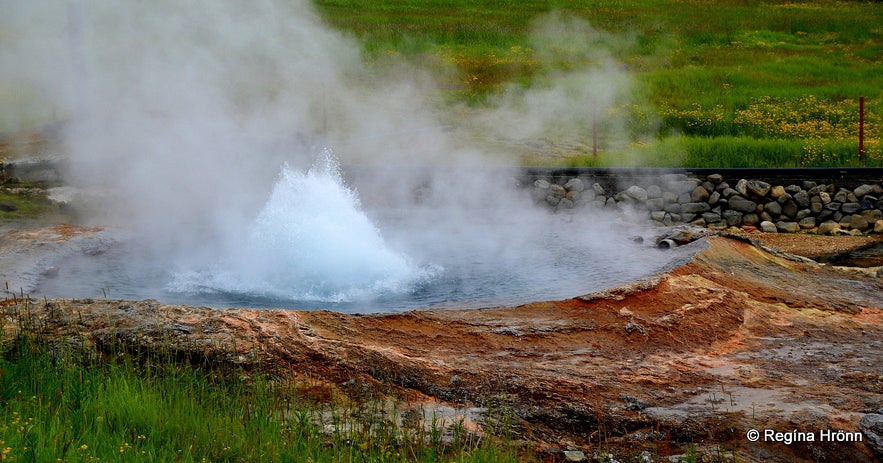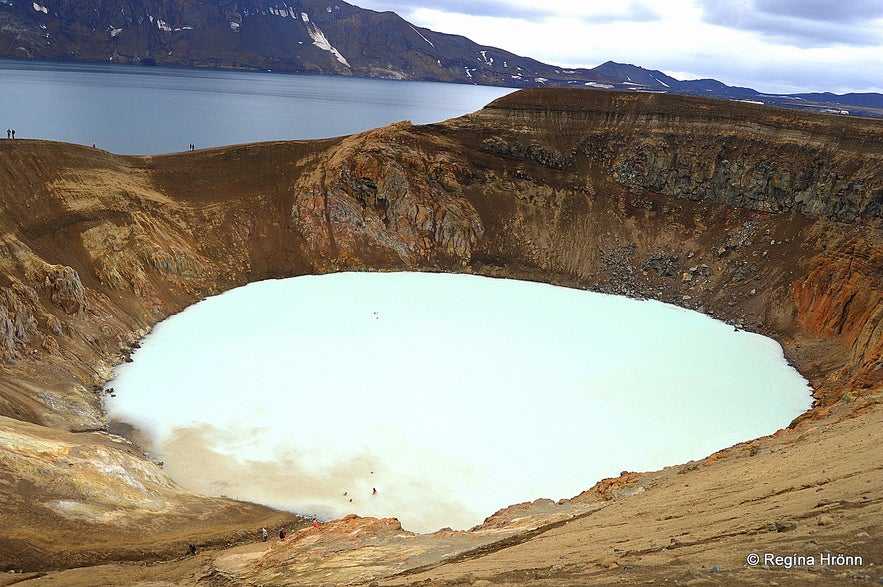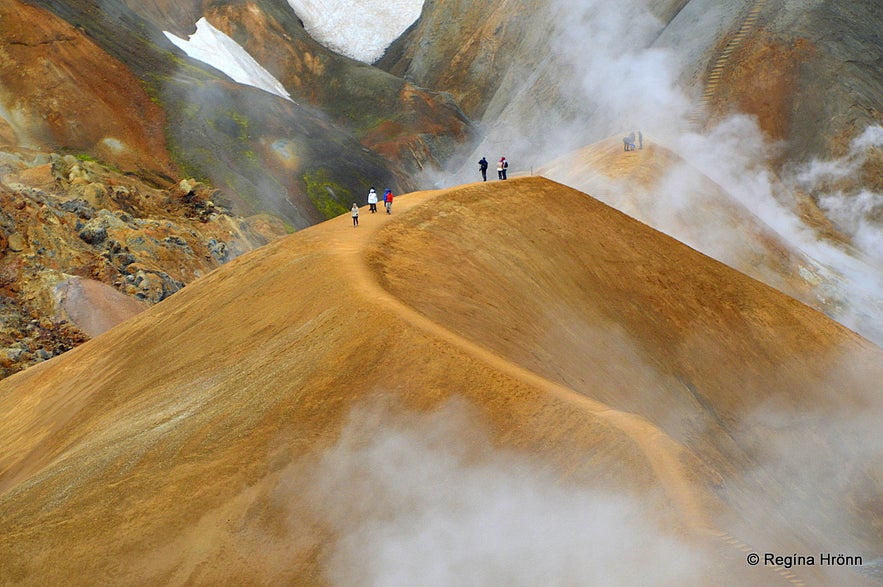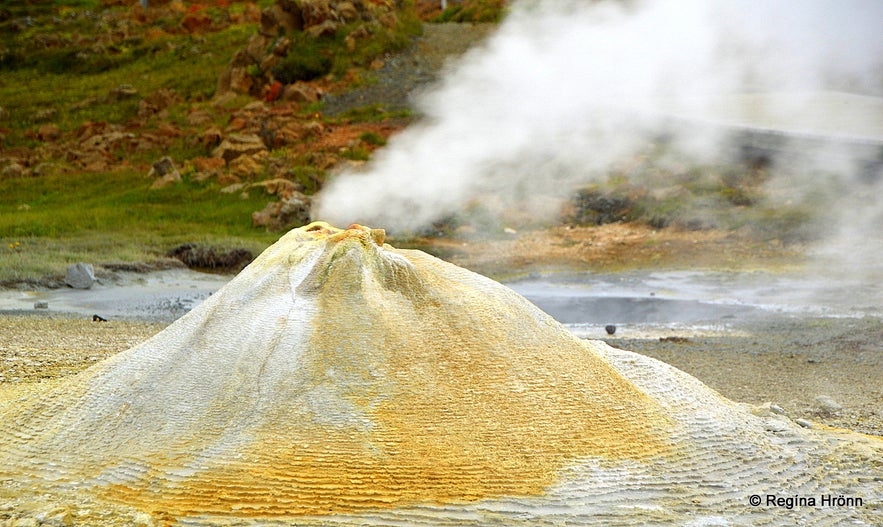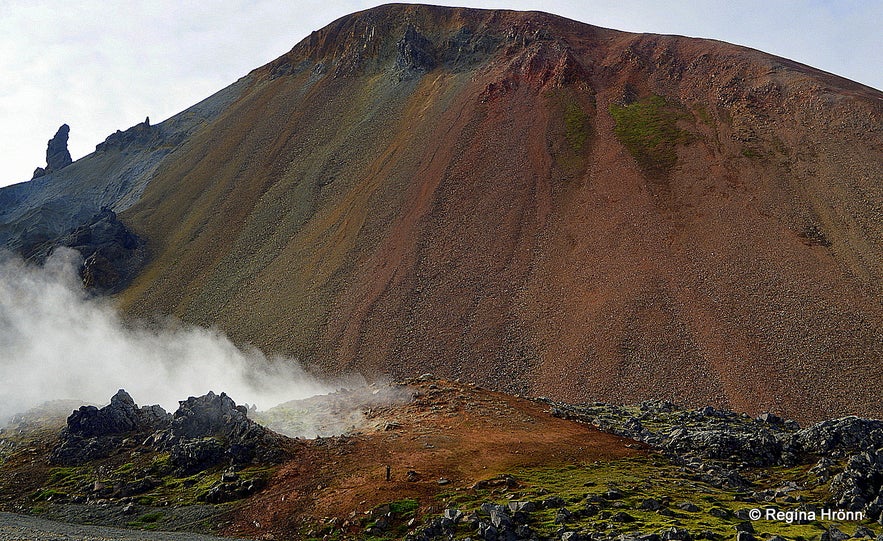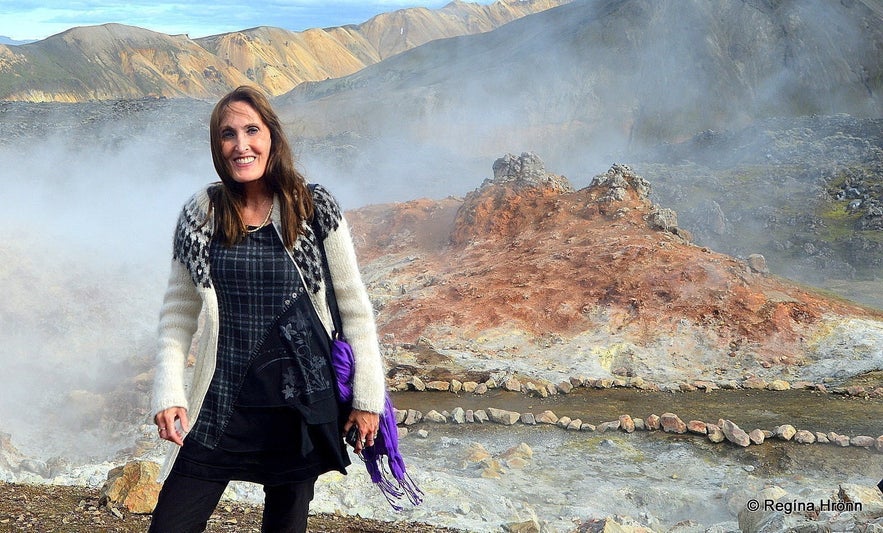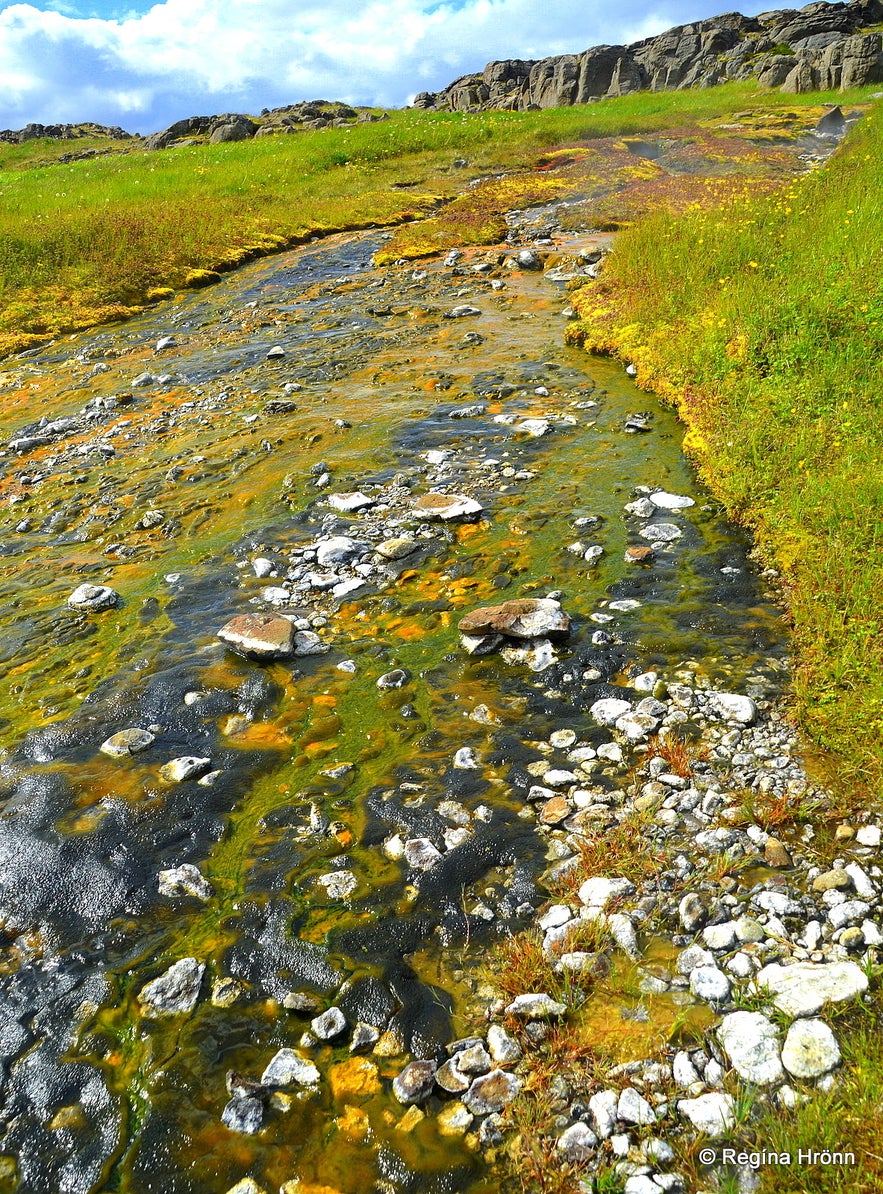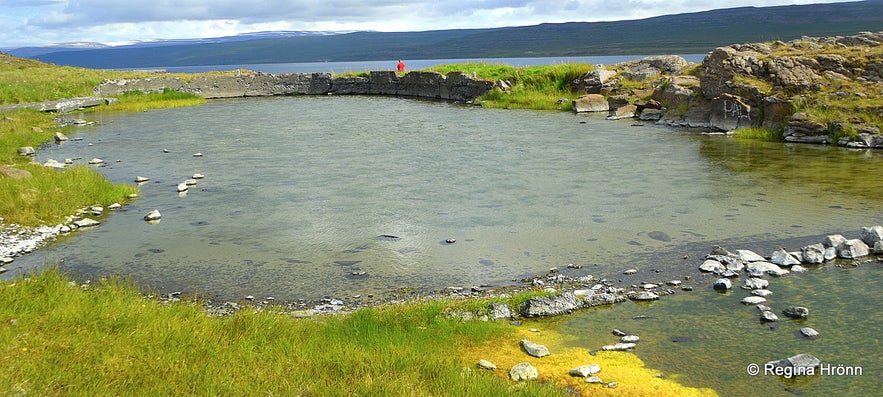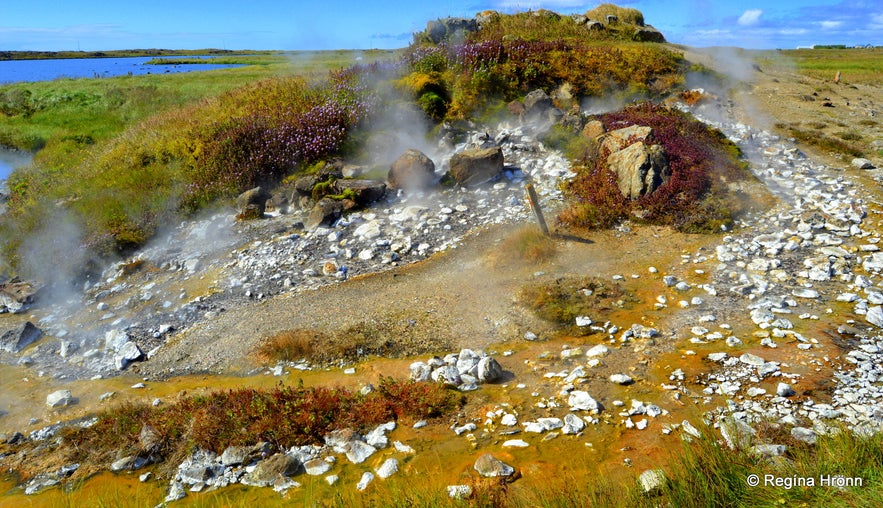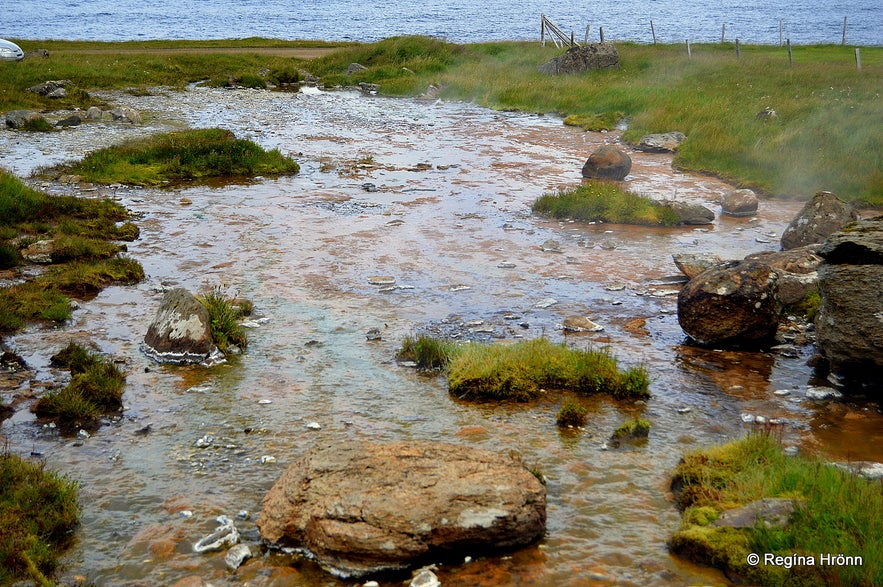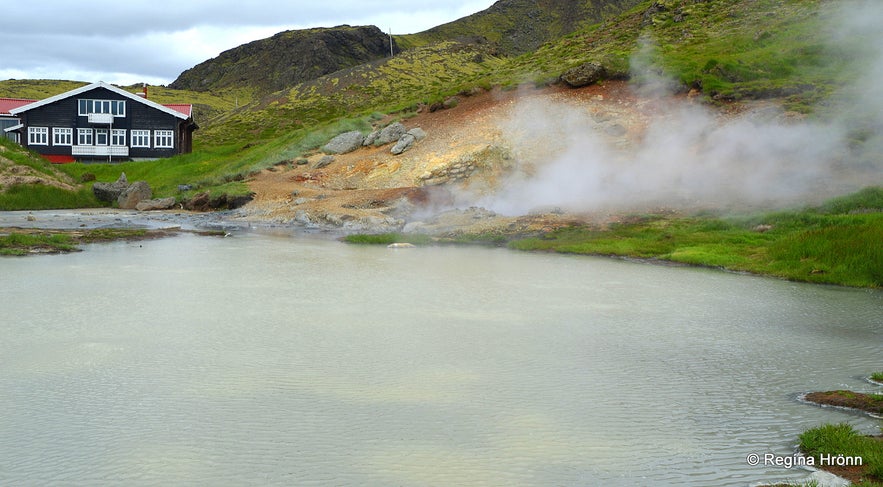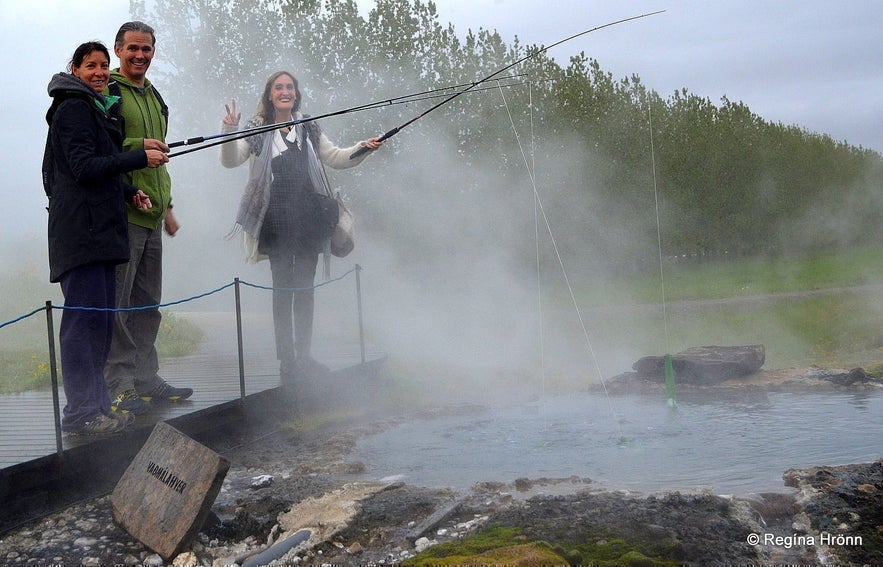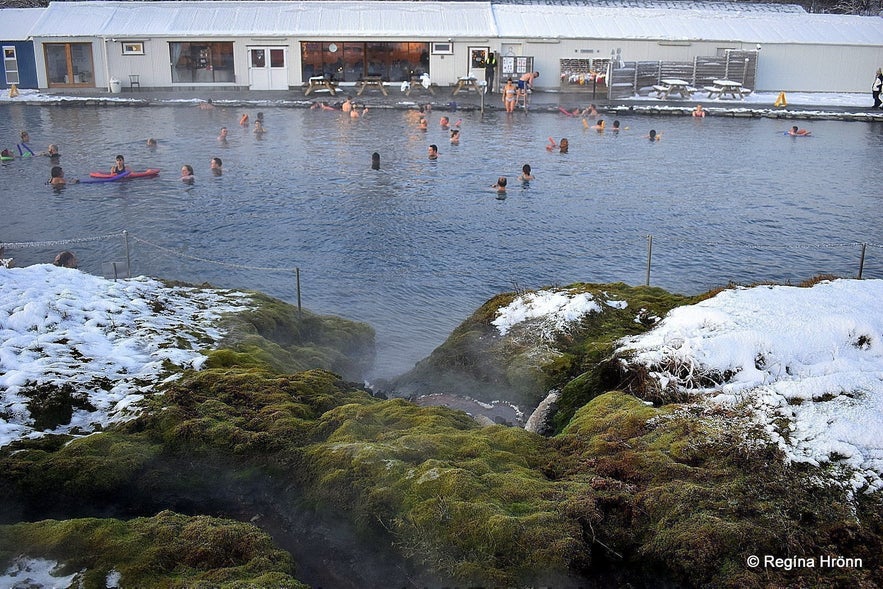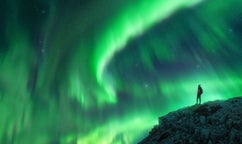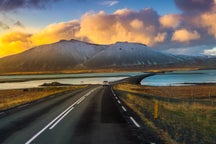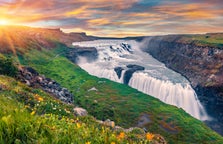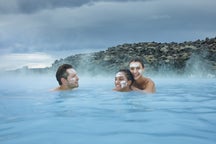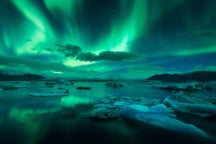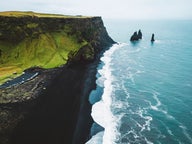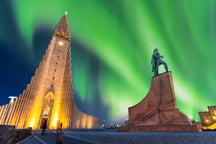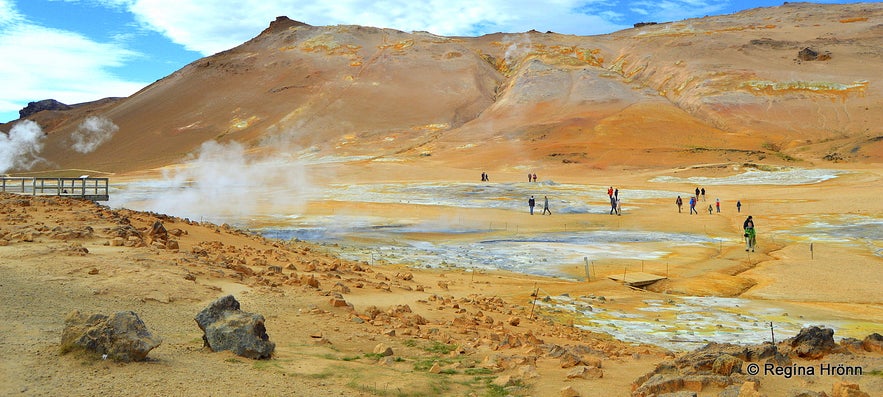
My country, Iceland, is often called The Land of Fire and Ice. It is a country of contrasts, with all its glaciers, volcanoes, and geothermal areas.
In this travel blog, I am going to show you a compilation of my favourite geothermal areas, with links to the travel blogs where I have written about them in detail.
I have visited many of Iceland's geothermal areas on my travels in my country, and it is otherworldly hiking between hissing vents, boiling mud pools, and spouting geysers, surrounded by breathtaking geothermal colours.
Top photo: Hverarönd by Mt. Námafjall in North Iceland
1. Geothermal Areas in South and Southwest Iceland
The Geysir Geothermal Area
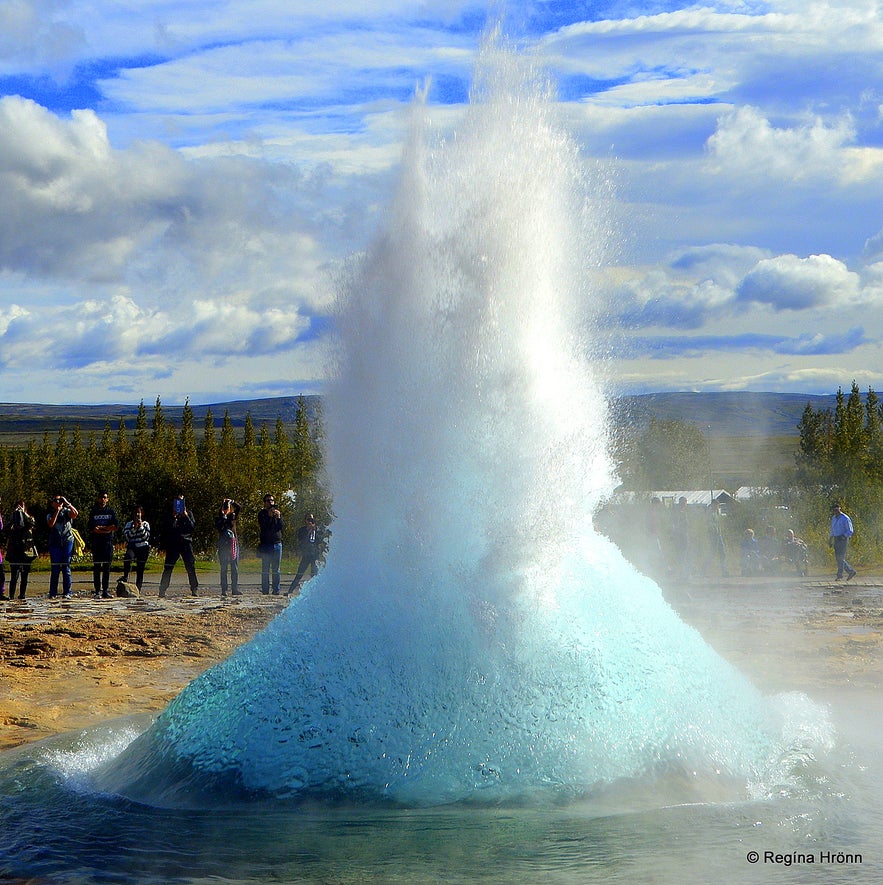 The bubble of Strokkur bursting
The bubble of Strokkur bursting
The best-known geothermal area in Iceland is, of course, the Geysir geothermal area, where Strokkur erupts approximately every 8 minutes, give or take a couple of minutes, some 25-35 meters in the air.
Most visitors to my country want to see this area. It is a major part of the Golden Circle route, along with Gullfoss waterfall and Þingvellir National Park.
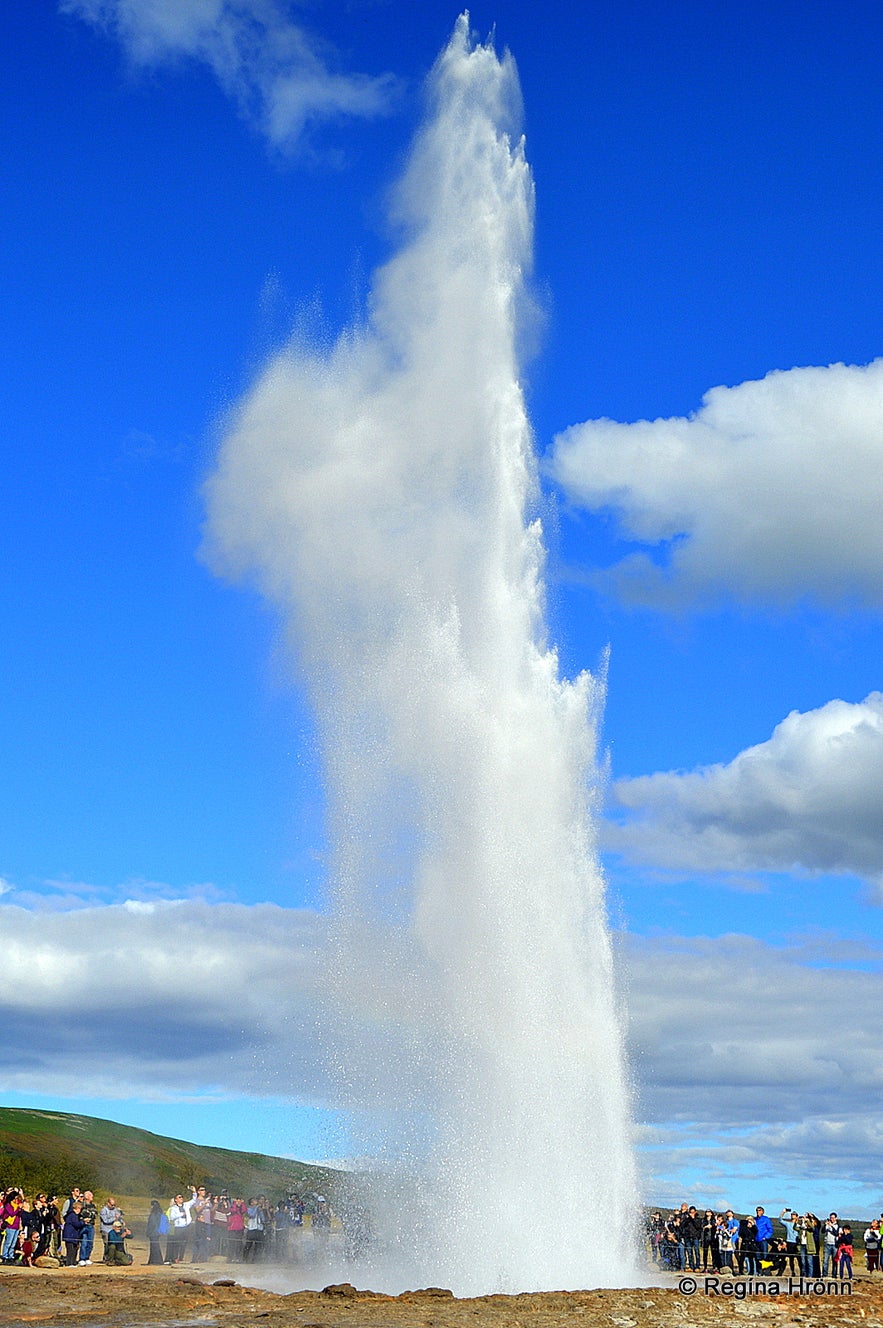
Strokkur erupting
The Geysir area is breathtaking, and I never tire of visiting it.
Apart from Strokkur, which is the most popular attraction here, you can see several mud pools and hot springs.
Like the Blesi hot spring, which is divided into two and looks like two blue eyes. One eye has the most spectacular azure colour, and the other one is almost transparent.
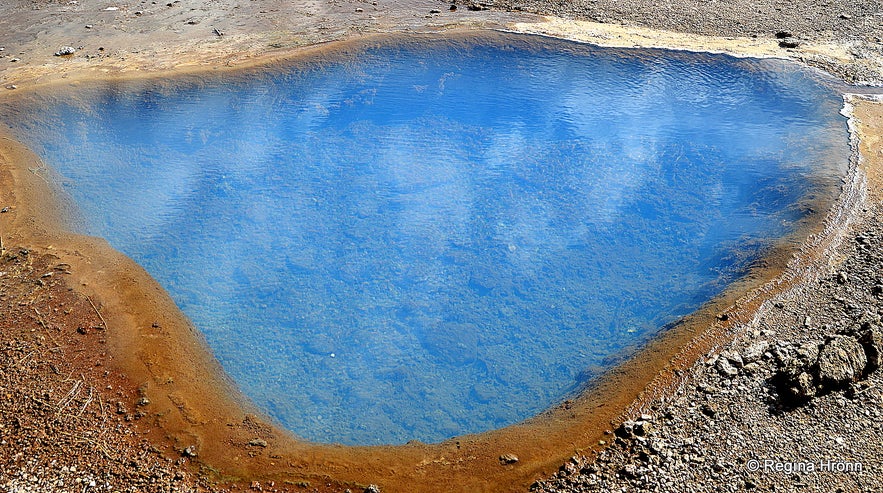
One of the eyes of the Blesi hot spring
We also have Konungshver - King's Hot Spring here, and Litli-Geysir - Little-Geysir, and many, many more interesting hot springs.
I have written in detail about this, the most famous geothermal area in Iceland, in my travel blog:
The spectacular Geysir Geothermal Area - Strokkur and all the other Hot Springs
Seltún - Krýsuvíkurhverir Geothermal Area
At the Seltún geothermal area
The closest geothermal area to Reykjavík in southwest Iceland is the colourful Seltún-Krýsuvíkurhverir hot springs.
It is located some 40 km from Reykjavík, making it a popular area to visit for locals and tourists alike.
The geothermal area at Seltún has wooden paths and two viewing platforms. Due to a couple of explosions, parts of this geothermal area have been restricted at times.
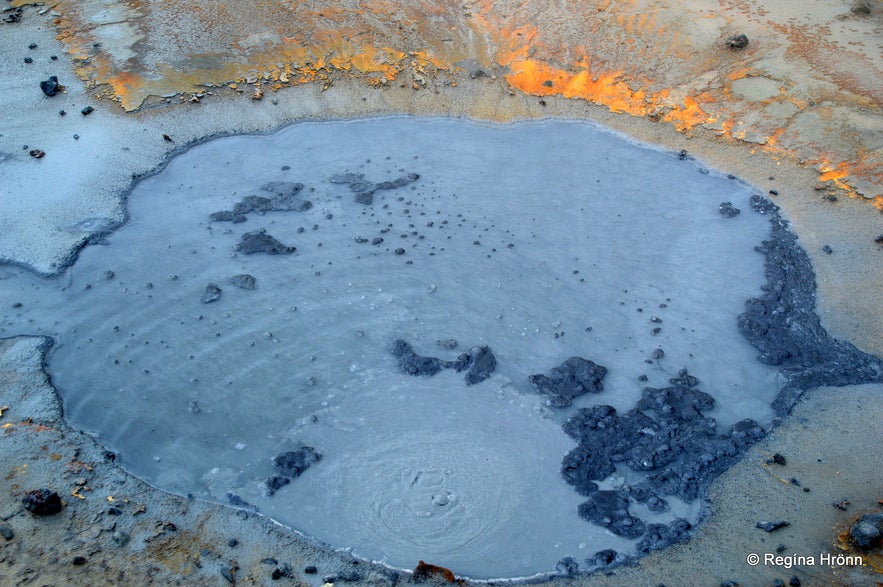
One of the colourful mud pools at Seltún
I love the details at Seltún and the extraordinary geothermal colours. I try to visit it when the sun is shining, as then the colours pop out and become very vivid.
At some of the geothermal areas, you will notice the overwhelming stink of sulfur, and Seltún is one of them. At Geysir, you don't notice the smell, but it can be overwhelming here at Seltún.
So much so that one mud pool across the road from Seltún is called Fúlipollur, or Foul Smelling Puddle.
Fúlipollur or Foul Pool
The heat at the Seltún geothermal area is 80-100 degrees C, so let's be careful here, hold on to the children, and always keep to the marked trails and pathways.
See also my travel blog: Seltún - the colourful Geothermal Area at Krýsuvík on the Reykjanes Peninsula in SW Iceland.
Gunnuhver Geothermal Area
Gunnuhver
Close to Seltún, there is another interesting geothermal area. This one is named after a ghost - Gunnuhver geothermal area.
Here at the Gunnuhver geothermal area, you will find Iceland's largest mud pool.
The steam is so massive here that you risk getting lost in the steam, but only for a short while.
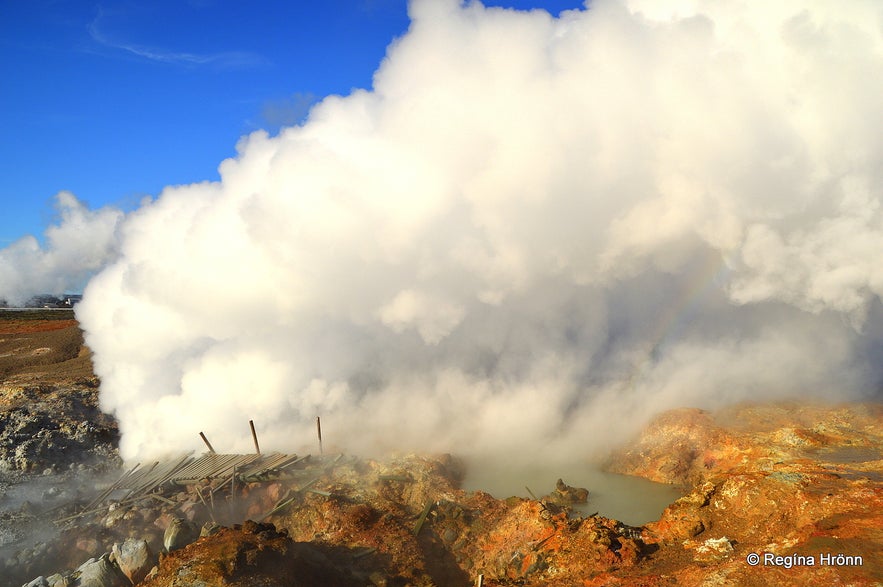
Gunnuhver
Seeing that this is a volcanic area on the tectonic plates, we have a lot of earthquakes here, and from time to time, Gunnuhver goes amok, shooting clay in all directions.
In my photo above, you can see the old observation platform in South Iceland in the middle of the mud pool. So let's always be extra careful here.
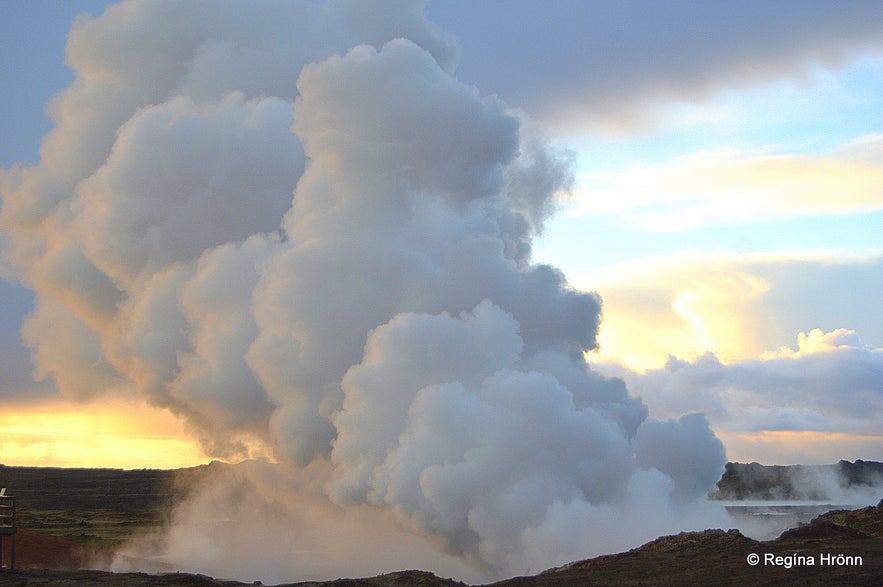
Gunnuhver
See also my travel blog: Have you met the angry Ghost at Gunnuhver Mud Pool in Reykjanes in SW Iceland?
Reykjadalur Geothermal Area
Reykjadalur valley
My most widely read travel blog is a blog I wrote about Reykjadalur valley, where you can hike up to a warm river, in which it is heavenly to soak.
This valley has always been popular amongst us locals and is now a favourite amongst our foreign visitors as well. A 45 km drive from Reykjavík will take you to the parking lot from where the hike starts.
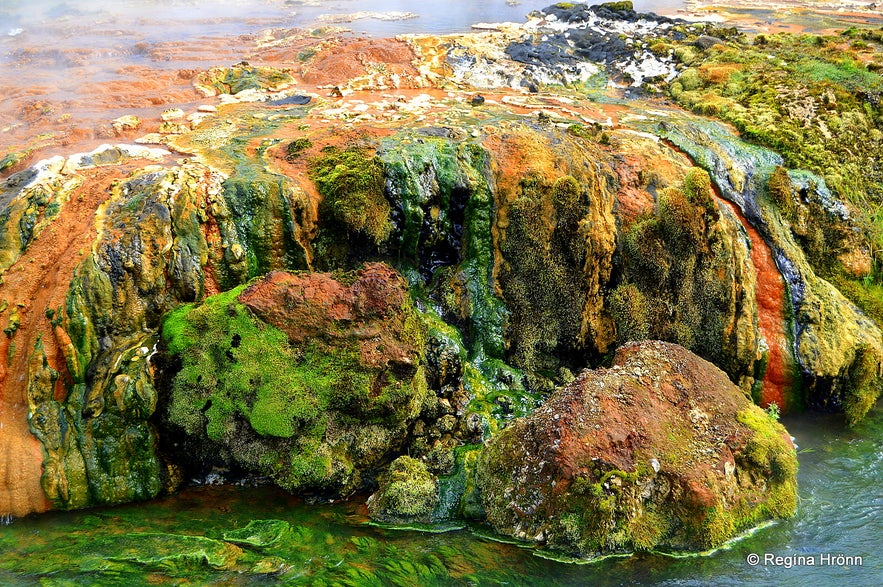
Geothermal colours in Reykjadalur valley
The relatively straightforward (a bit upwards) 3-km hike into the geothermal valley will take some 45-60 minutes to complete.
In the hot spring valley, you will see a myriad of hot springs, mud pools, and this beautiful warm river. You will also notice some colourful geothermal plants, some of which are endangered species.
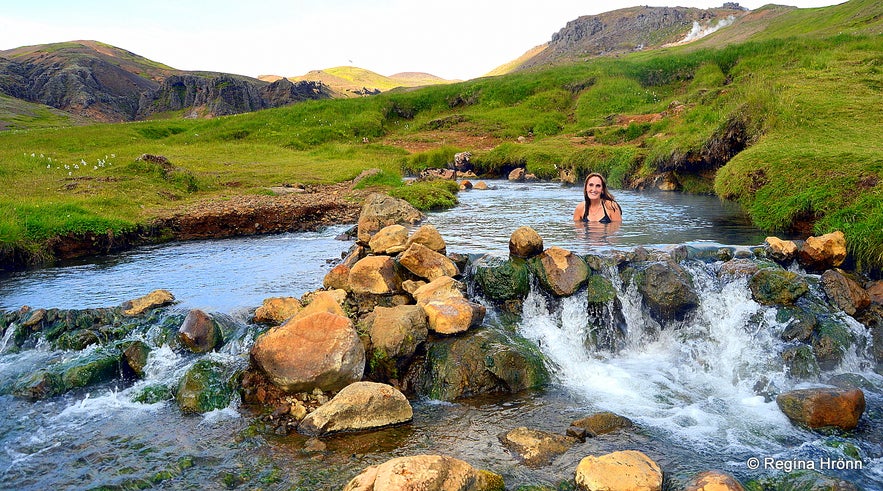
Soaking in the warm river in Reykjadalur
A little bit above the warm river, you will find a beautiful gorge, Klambragil, and a small geothermal area.
One spot here, in particular, is magical. It is referred to as the clicking hot spring inside the rock. It is prettySouth Iceland amazing listening to the hot water boiling inside the cliff!
I even got a letter from one traveller who asked if she could use this clicking sound of the hot spring in some music she was composing :)
See also my travel blog:
Reykjadalur Valley - Bathe in a Hot River in South Iceland! In my travel blog, I have written a detailed description of the hike and valley.
Frost og Funi - The Frost and Fire Hotel
The Frost and Fire Hotel
After one of my hikes up to Reykjadalur valley, I stayed at Hotel Frost og funi - the Frost and Fire hotel, which is midway between Hveragerði town and the start of the hike up to the Reykjadalur valley.
We loved our stay, and it was heavenly soaking in the hot tub listening to the clicking sounds of the hot spring opposite the Varmá river.
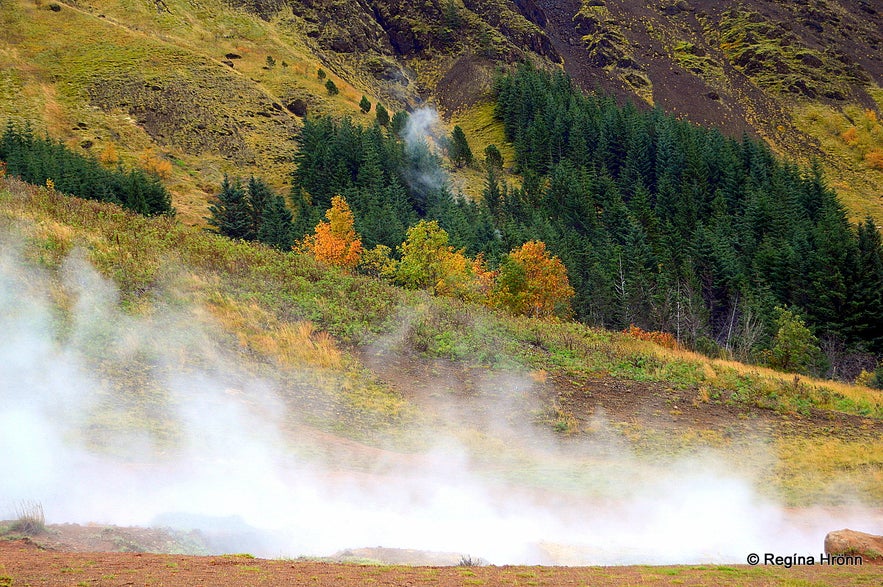
The geothermal area above Hveragerði
You can also visit a geothermal area above the hotel.
Cross the bridge over the Varmá river by the hotel, then turn right for the geothermal.
Be very careful here. After the earthquake Suðurlandsskjálftinn in 2008, this whole area changed, and new hot springs and mud pools appeared.
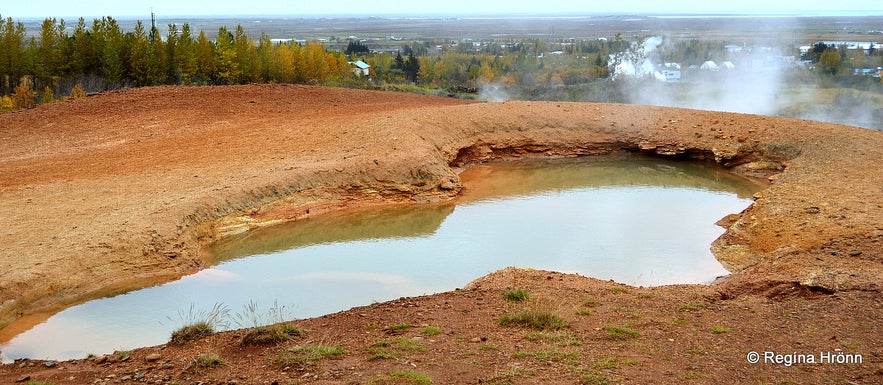
The geothermal area above Hveragerði
Outside the hotel, you will find a hot spring in which you can boil eggs for breakfast.
You get a fishing rod and a net from the hotel, and soft-boil an egg in 10 minutes, and hard-boil an egg in 15 minutes, if my memory serves me right.
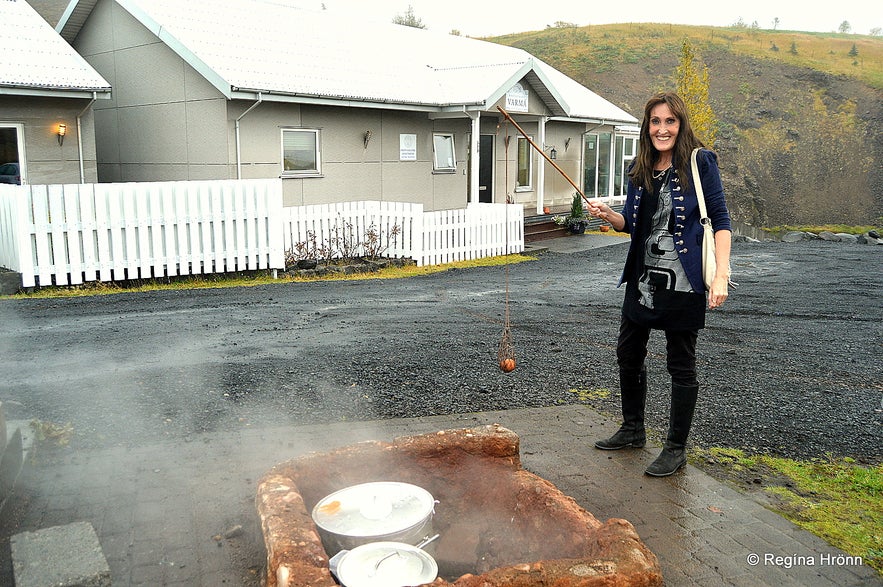 Boiling an egg for breakfast. You can see hverabrauð - hot spring rye bread being cooked in the hot spring.
Boiling an egg for breakfast. You can see hverabrauð - hot spring rye bread being cooked in the hot spring.
You can see many more photos in my travel blog: A fantastic Stay at the Frost and Fire Hotel on the Banks of the Varmá River in South Iceland
Nesjavellir Geothermal Area
Another beautiful geothermal area near Reykjavík is Nesjavellir.
It is very colourful and diverse, and a hike in this area will leave no man untouched, especially on a sunny day when the geothermal colours are very vivid.
The geothermal area at Nesjavellir, Nesjalaugar, and Köldulaugar is as colourful as these areas get, ranging from shades of brown, yellow, and orange to the brightest red and the most vivid blue of the geothermal water.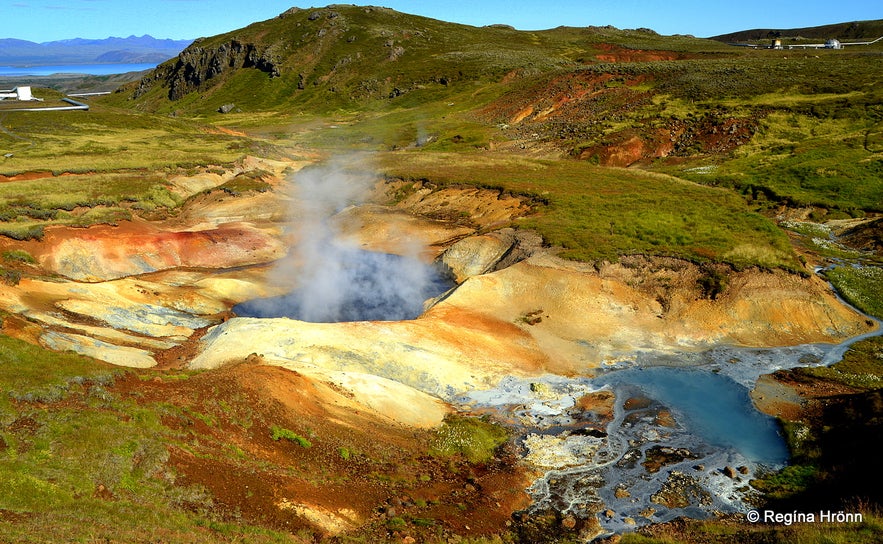
Nesjalaugar geothermal area
This hike is among my favourites in South Iceland. I am not a big hiker, so this easy hike is just up my alley, and it is a feast for the eyes and the spirit.
Let's always be very careful here, stick to the paths, and never take any risks.
These beautiful areas are dangerous, after all.
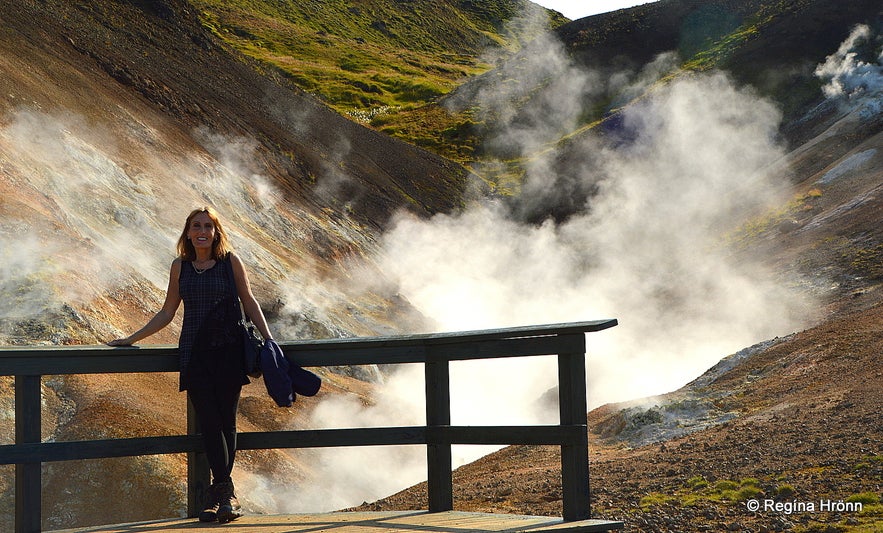
By Köldulaugar
Köldulaugar hot springs literally translate into Cold hot springs, but this area is filled with fumaroles and solfataras - mud springs, so don't get fooled by the name; this is a highly geothermal area.
Here you will see more brownish and yellow colours of silica and sulfur deposits with red veins in the small creeks - that is the red colour of the iron compound.
A very colourful Hike through the Hengill Geothermal Area at Nesjavellir in South-West Iceland, where I show you the hike in detail.
A Helicopter Ride to Ölfusvatnslaugar
Ölfursvatnslaugar geothermal area
I have flown in a helicopter three times, and I was lucky that the sun was shining brightly in Reykjavík on both of my visits to Ölfusvatnslaugar.
The pilot took us on a scenic tour of the city and landed just east of Reykjavík in a beautiful geothermal area, Ölfusvatnslaugar, also known as Hagavíkurlaugar.
I had never visited this beautiful geothermal area before, and the pilot told us that it would take hours to hike up to it.
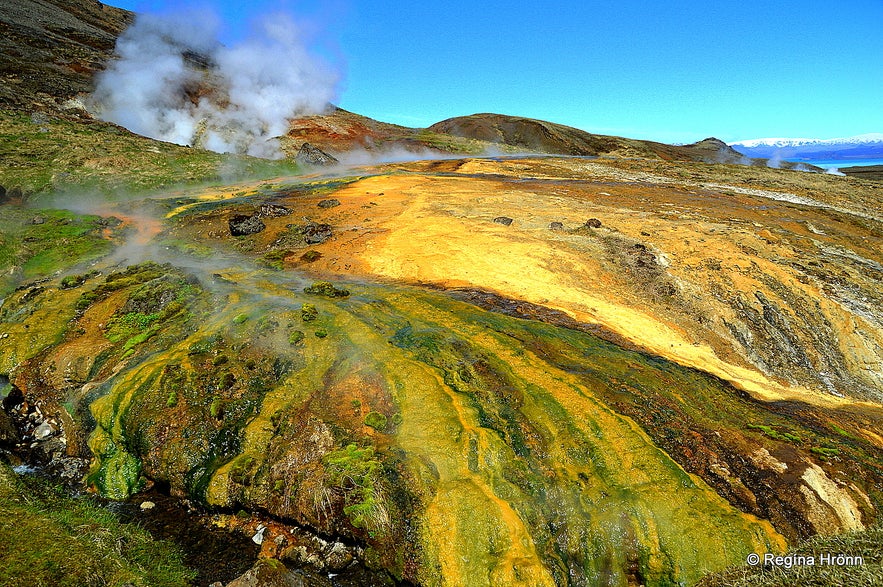
Ölfursvatnslaugar geothermal area
Shortly after we had landed, another helicopter from the same company, Norðurflug, arrived. It was pretty surreal seeing the helicopter hovering above and landing in this beautiful area.
All in all, the helicopter ride with the stop at this beautiful geothermal area took only 1 hour. To me, though, it felt like a day tour, as both the ride and the geothermal area were thrilling and left me elated.
Highly recommended, especially on a sunny day :)
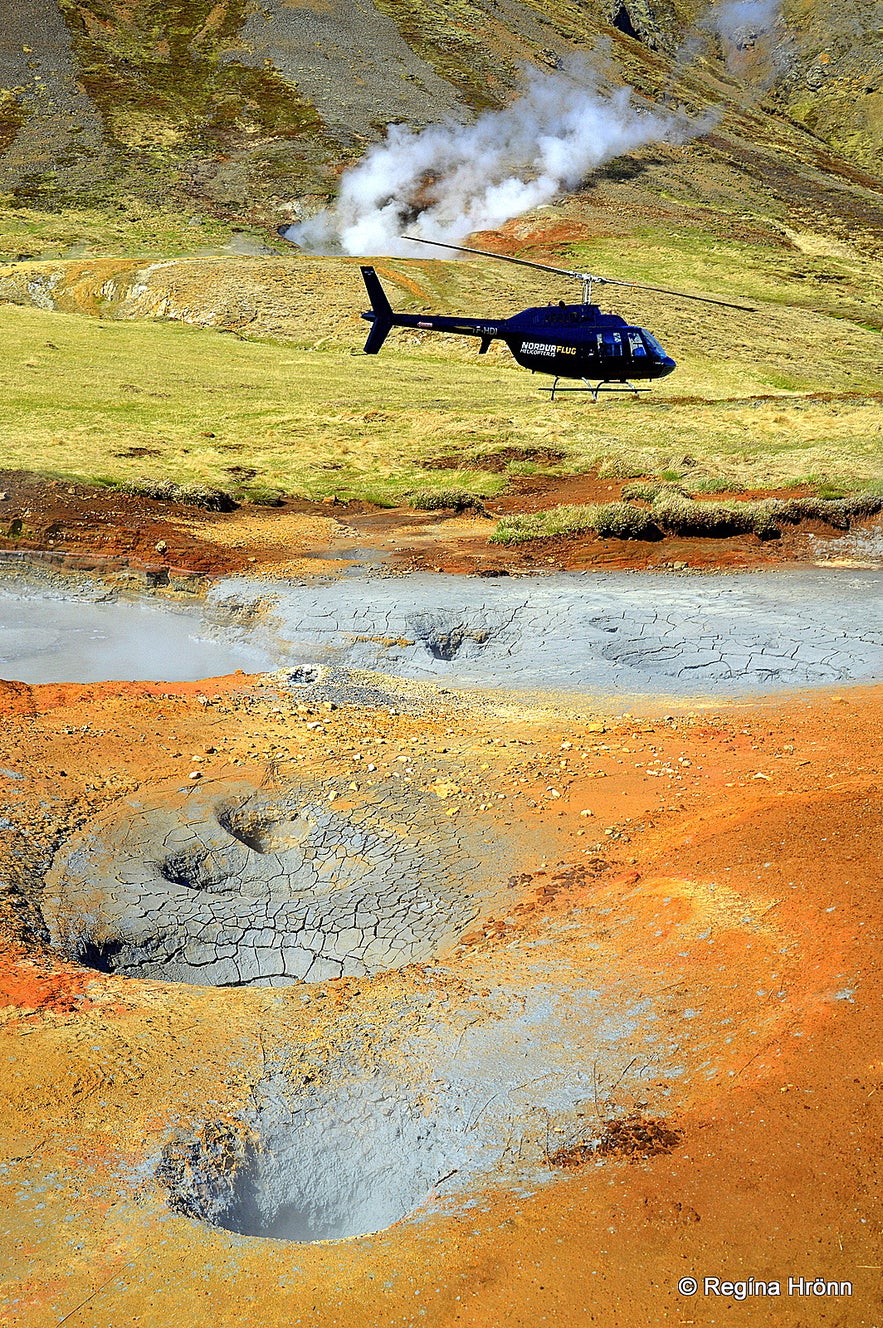
Ölfursvatnslaugar geothermal area
See how the earth is boiling and cracking from the extreme geothermal heat? Let's always stay on the paths and grassy areas, as these geothermal areas are hazardous.
But following all safety precautions, a visit to these geothermal areas is a delight and one of my favourite activities in my country.
See also my travel blog:
A fantastic Helicopter ride with Norðurflug from Reykjavík to a Geothermal Area in South Iceland
2. Geothermal Areas in West Iceland
Deildartunguhver - Europe's Most Powerful Hot Spring
Deildartunguhver
In West Iceland, you will find the most extensive geothermal hot spring in Europe, Deildartunguhver. Deildartunguhver hot spring provides 180 l/sec of 97° hot water.
The hot spring is harnessed, and the water is used for heating the houses in the nearby towns of Akranes and Borgarnes.
Deildartunguhver is a massive hot spring, but only 40% of the geothermal spring water reaches the surface. It is a series of hot springs covering an area of some 50 meters. It is fenced off for our safety, as it has been known to show some action and start spouting hot water in all directions.
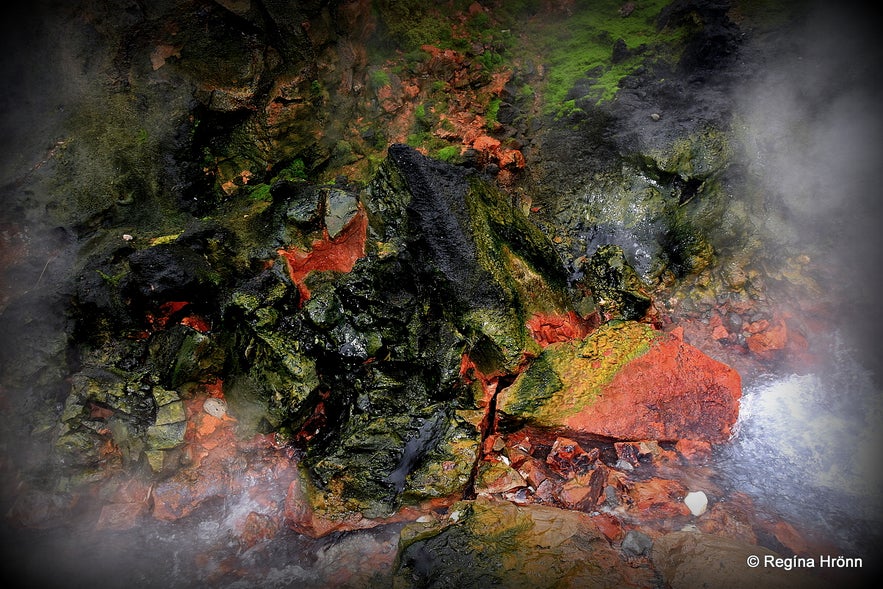
Deildartunguhver
This is another geothermal area like Gunnuhver in southwest Iceland, where the steam can engulf you, making it hard to get a decent photo.
Some of the rocks are bright red in colour, and one of the vents in Deildartunguhver got the name Sláturhver or Slaughter hot spring!
The beautiful green moss complements the lava's redness, making for a beautiful photo.
Soaking in Krauma
A new addition to this area is Krauma geothermal baths next to Deildartunguhver, where the water from the hot spring is used for five hot tubs.
You can also take a dip in the cold water coming straight from the former glacier Ok.
Krauma is such a lovely addition to this area. Deildartunguhver and Krauma are on the Silver Circle of Iceland.
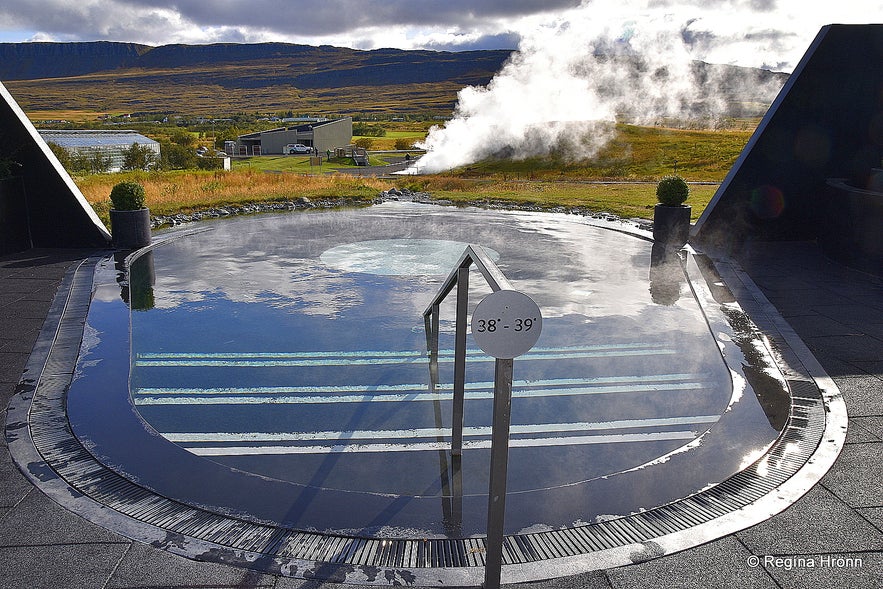
Krauma
See also my travel blog about Deildartunguhver, Krauma, and the spectacular Silver Circle of Iceland:
The Spectacular Silver Circle of West Iceland
Árhver/Vellir - The Hot Spring in the Middle of a River
Árhver hot spring
Not far from Deildartunguhver and Krauma, you will find a hot spring in the middle of the Reykjadalsá river.
Most people overlook it. This hot spring goes by four names: Árhver, Vellir, Vellindishver, and Vellineshver hot spring.
Árhver is called Iceland's most peculiar hot spring. Árhver is about 1 meter in diameter and contains about 100°C hot water! It has a flow of 10-15 liters per second.
It is lovely sitting by the hot spring on a summer night, listening to the hot spring's clicks and the sounds of nature.
Read more in my travel blog: Árhver/Vellir in West Iceland - Have you ever seen a Hot Spring in the Middle of a River?
3. Geothermal Areas in North Iceland
Hverarönd by Mt. Námafjall
Hverir geothermal area
The best-known geothermal area up north is called Hverir by Mt. Námafjall.
It is one of the largest sulfur spring areas in Iceland and is very easily accessible, right by the ring road.
The bubbling and hissing geothermal area covers some 4 km2. Here you will see vast fumaroles and steaming vents, which have earned this area the nickname Eldhús djölfulsins, or Hell's Kitchen.
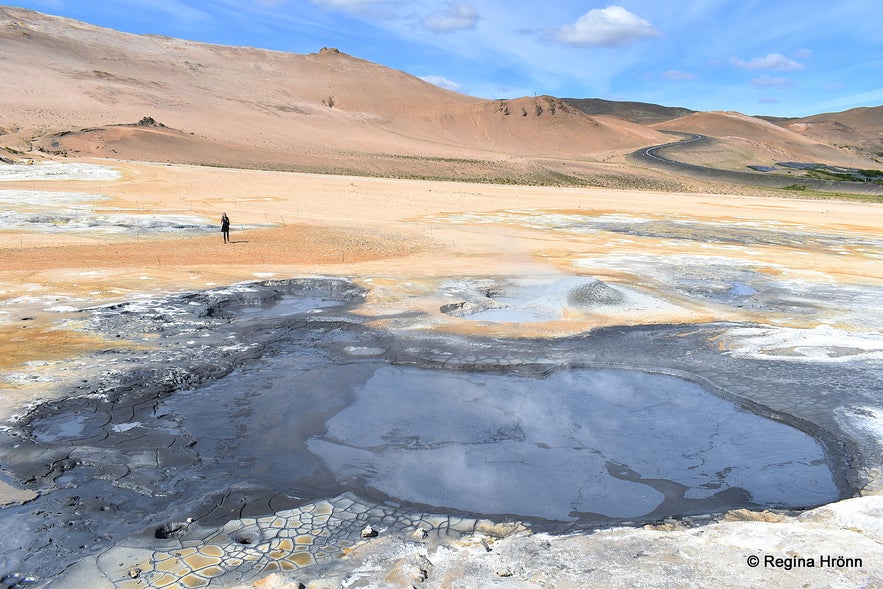
Hverir geothermal area - I was alone here in the summer of 2020
There is a lingering pungent smell of sulfur in the air, and steam and fumarole gas are everywhere, among them hydrogen sulfide.
This is the only area where I have got sulfur poisoning! The wind was so strong that it blew the fumes right into my face, leaving me with a bad headache and nausea for some days.
Just be careful and enjoy this marvellous geothermal area.
See also my travel blog:
Mývatn in North Iceland - Part IV - Mt. Námafjall, Krafla & Leirhnjúkur Geothermal Areas
Leirhnjúkur Geothermal Area
Leirhnjúkur
Leirhnjúkur is another very colourful geothermal area in the Krafla area with lovely, brilliant geothermal colours.
I always feel like I stepped into a lunar landscape when I visit Leirhnjúkur.
There are so many contrasts at Leirhnjúkur; the volcano itself is red, pink, and orange, and the geothermal water is opaque blue and white.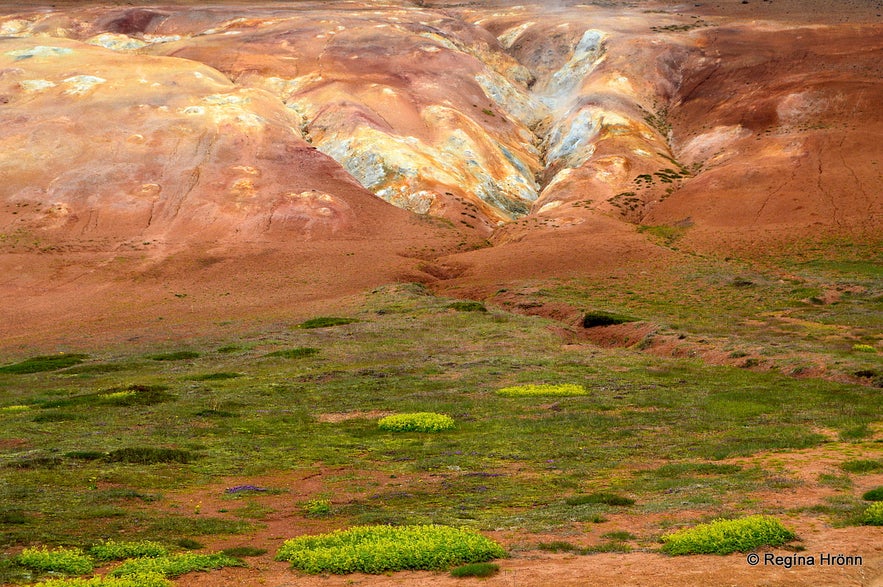
Leirhnjúkur
Mt. Leirhnjúkur rises 592 meters above sea level, but only 50 meters above the ground, so you might not even notice that it is an actual volcano. The mountain's name means "Clay Hill."
This area has got the WOW factor big time, both the vivid geothermal colours and the black, still-smoking lava.
I am sure that a visit to Leirhnjúkur will leave no man untouched. I can only speak for myself, but this area has always had a profound effect on me whenever I visit it.
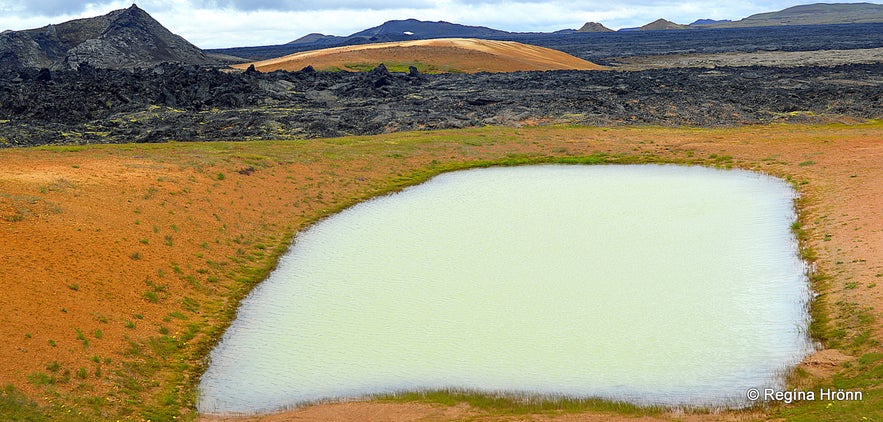
Leirhnjúkur
Here you will hike amid smoking lava, with boiling springs and a myriad of fumaroles and colourful bubbling hot springs.
The black lava takes on all kinds of forms, and you will see little balls of yellow sulfur in some areas.
Measures were taken back in the summer of 2019 to preserve this delicate area and to keep people safe.
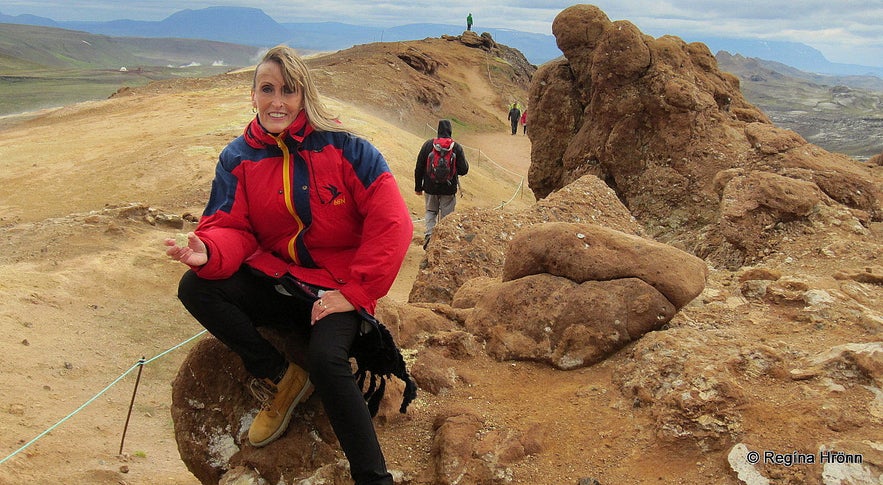
Leirhnjúkur - holding a chunk of sulfur
Mývatn in North Iceland - Part IV - Mt. Námafjall, Krafla & Leirhnjúkur Geothermal Areas
The Geothermal Area by Stóra-Víti and Krafla
Stóra-Víti and Krafla geothermal area
If you have time to visit the Krafla area opposite the road from Leirhnjúkur, then I would recommend it.
There is a beautiful geothermal area behind the Stóra-Víti explosion crater with the most striking geothermal colours.
To reach this area, you will have to walk on the rim of Stóra-Víti crater; just be aware that it can get very windy up there.
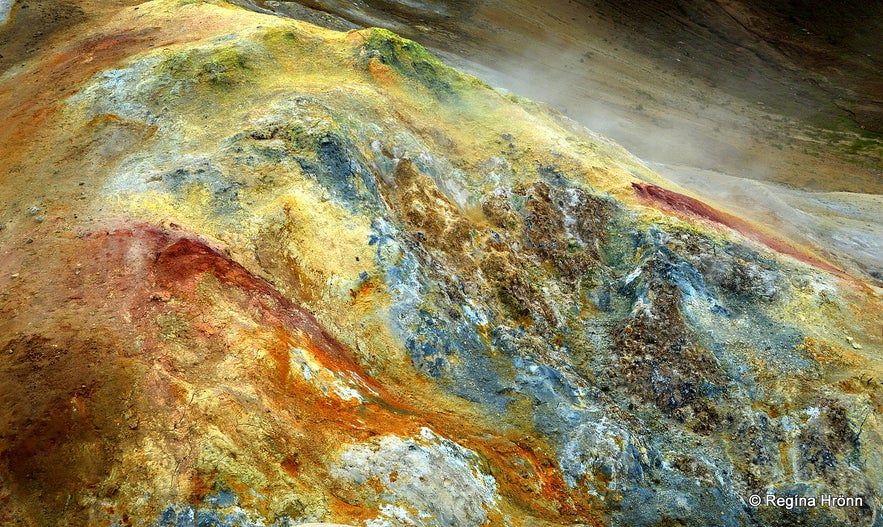
Stóra-Víti and Krafla geothermal area
The path was closed in the summer of 2019 to keep people safe and to preserve this area. Some people were straying from the trails and putting themselves in danger, as you can see in my travel blog about this area:
Mývatn in North Iceland - Part IV - Mt. Námafjall, Krafla & Leirhnjúkur Geothermal Areas
Þeistareykir Geothermal Area
Þeistareykir
There is another beautiful geothermal area up north that is much less visited than Hverarönd and the Krafla area.
It is called Þeistareykir geothermal area and is well worth a visit if you want to be relatively alone in nature.
The Þeistareykir area is a fumarole area with solfataras and clay pools.
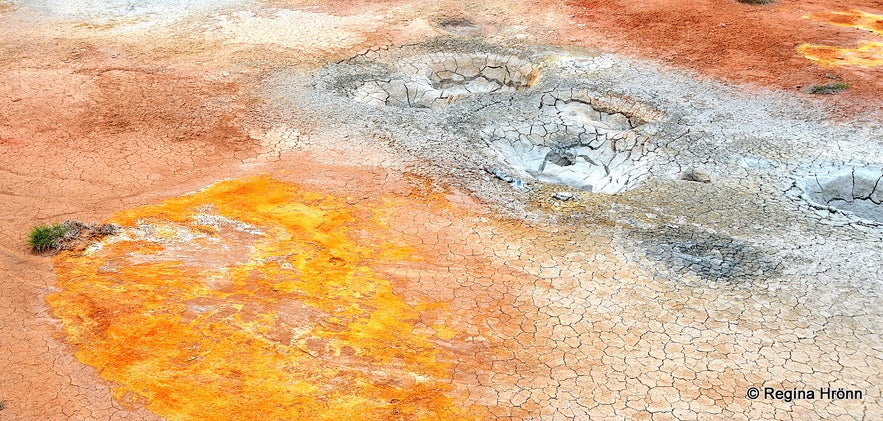
Þeistareykir
This area is now very accessible, with Þeistareykir having built a new geothermal power station. There are two ways to visit this area: from Mývatn and via Húsavík.
Here at Þeistareykir, the earth is orange and bright red, white and yellow, with grey mud pools and fumes rising out of the earth, giving a mysterious feel to this area. Especially if you know the old ghost stories.
There are also several stories of polar bear sightings at Þeistareykir, all of which you can read about in my travel blog about this area.
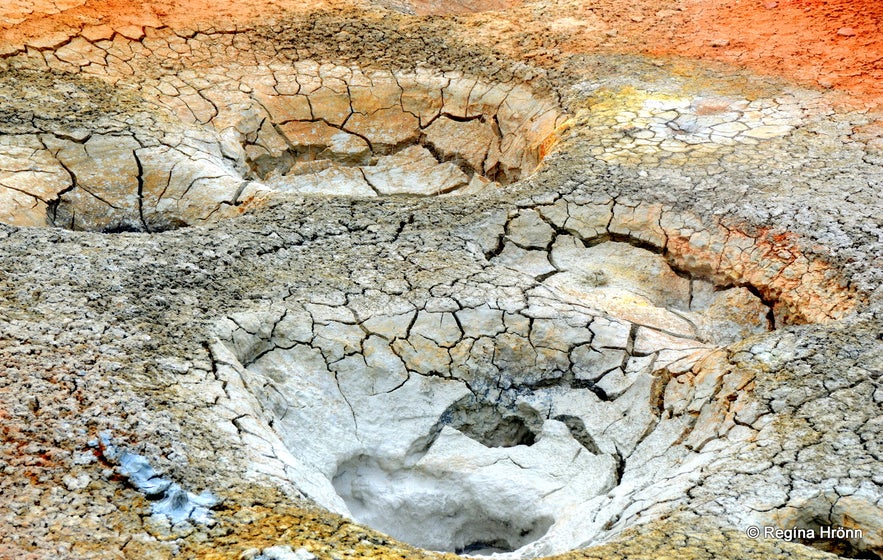
Þeistareykir
You will notice the striking yellow colour. This is sulphur, and there used to be sulphur mining here at Þeistareykir for our Danish king, who needed gunpowder for the Danish army.
Sulphur was also mined at the Mt. Námafjall area at Mývatn and the Krýsuvíkurhverir geothermal area in southwest Iceland, which I have told you about earlier.
I took this video during my first visit to Þeistareykir. It was raining heavily, and you can hear the rain in my video.
On my later visits, the sun was shining, making the geothermal colours bright and vivid :)
See also my travel blog:
The colourful Þeistareykir Geothermal Area in North Iceland
Baðstofuhver at Hveravellir in Reykjahverfi
Baðstofuhver hot spring
At Hveravellir in Reykjahverfi in North Iceland, you will find a beautiful geyser called Baðstofuhver hot spring - but "baðstofa" means the living room and bedroom in the old Icelandic turf houses.
Other names for this hot spring are Ystihver and Norðurhver.
This hot spring is so impressive, and if it were still spouting like it used to, it would be a major tourist attraction in this area. It spouts a little, as you can see in my video below.
There are many more hot springs here at Hveravellir, but they have been harnessed by the farmers, as the hot springs are literally in their backyard.
Wondermondo has a very good description of this geothermal area in English.
4. Geothermal Areas in the Highland of Iceland
Askja - Víti Crater
Víti explosion crater
Now, this is an exceptional area to visit, and it takes some doing!
You can join a day tour where you will be guided through the rugged Highland of Iceland until you reach a big explosion crater with white and opaque blue geothermal water.
It is indeed quite a special geothermal area.
The 150-meter-diameter crater is filled with a 22-26 degrees C geothermal lake (stinking of sulphur), in which one can bathe. Here you will see geothermal colours and strange lava formations in abundance
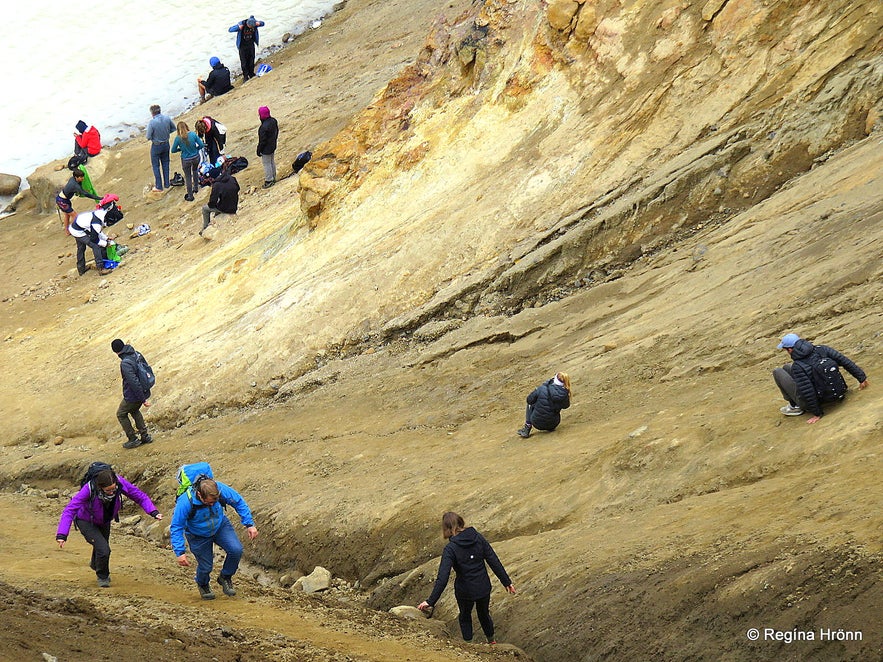
People struggling to visit the steep explosion crater
I have never had the time to dip into the hot water, but I took photos of a myriad of people sliding down the rims of the explosion crater.
This area can be dangerous due to landslides and earthquakes, which took place here in 2014, right after I had visited Askja for the first time.
Then the calm water would not have been this smooth, and it would have been extremely dangerous to bathe in it.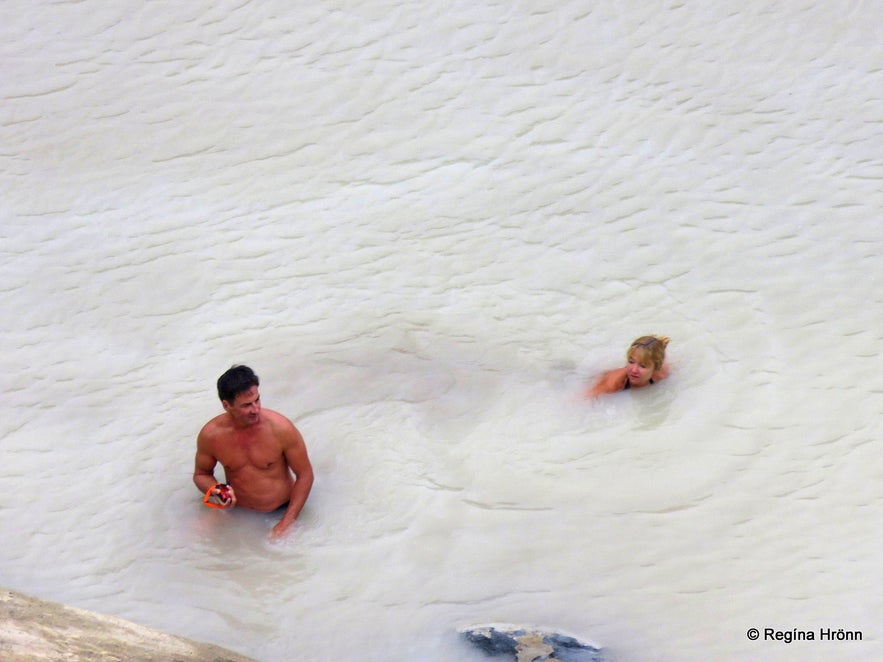
Taking a bath in the Víti explosion crater
See also my travel blog:
An amazing Tour to Askja and Holuhraun Lava Field in the Highland of Iceland
Kerlingarfjöll - Hveradalir Geothermal Area
Kerlingarfjöll geothermal area
One geothermal area, in particular, always blows my mind: the Hveradalir geothermal area in Mt. Kerlingarfjöll, one of the largest high-temperature geothermal areas in Iceland.
This area has got the WOW factor big time, and no matter how often I visit this extraordinary area, I am blown away.
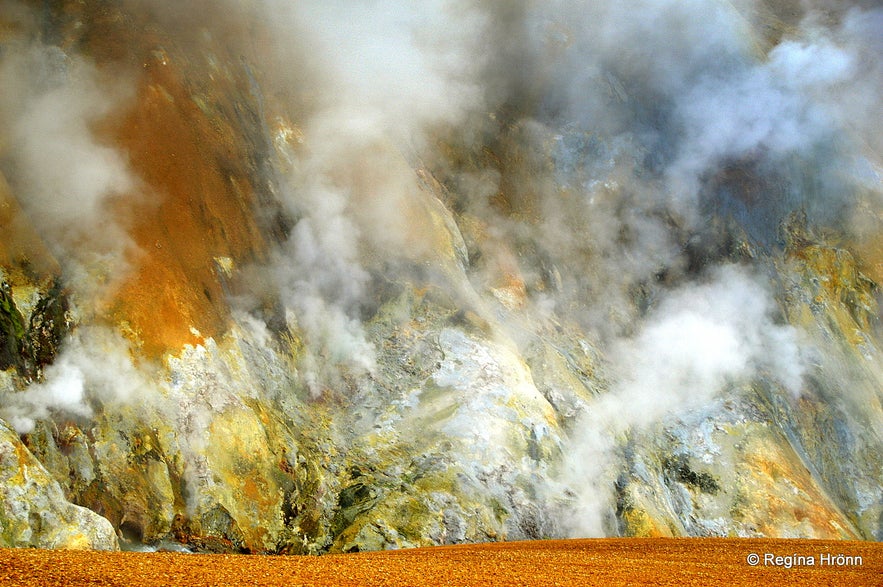
Kerlingarfjöll geothermal area
Here we find ourselves at some 6-700 meters above sea level in a massive mountain range, nestled between the glaciers, Langjökull and Hofsjökull, which are Iceland's 2nd and 3rd largest glaciers.
Several trails lead through this massive high-temperature geothermal area, and you can take both long and short hikes here.
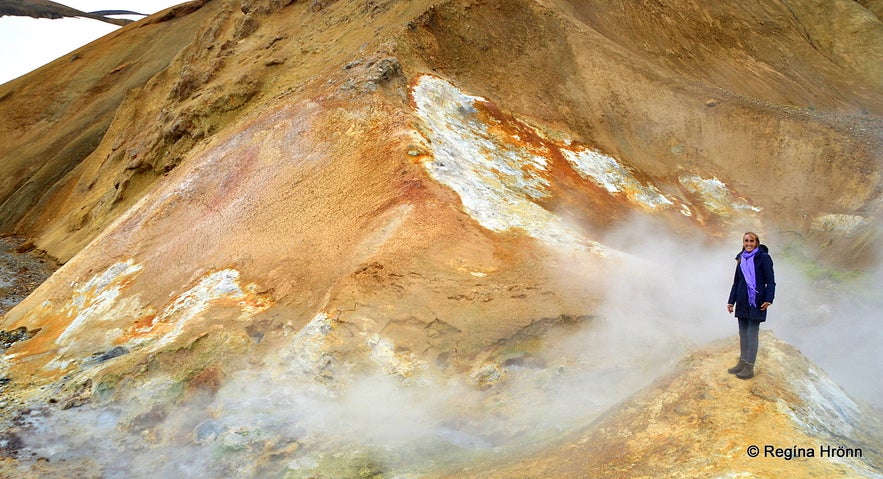
Kerlingarfjöll geothermal area
The whole geothermal area is hissing, boiling, and bubbling, and it is somewhat scary hiking in this area, witnessing the massive hot forces of nature in action.
Dress warmly as even in the summertime it can get pretty cold being so high up in the Highland of Iceland.
See also my travel blog with many more photos and descriptions of this area:
A fascinating Hike through the Geothermal Area of Hveradalir in Mt. Kerlingarfjöll
Hveravellir Geothermal Area
Öskurhóll hot spring
Some of the most beautiful geothermal hot springs in Iceland can be found at Hveravellir in the central highland of Iceland.
This geothermal area is, in my opinion, one of the pearls of Iceland, an oasis 650 meters above sea level.
Here you will find a beautiful geothermal area with extraordinarily beautiful hot springs, boiling mud pools, and huffing-and-puffing fumaroles. Visiting this area makes it hard to believe this is nature, not an art gallery.
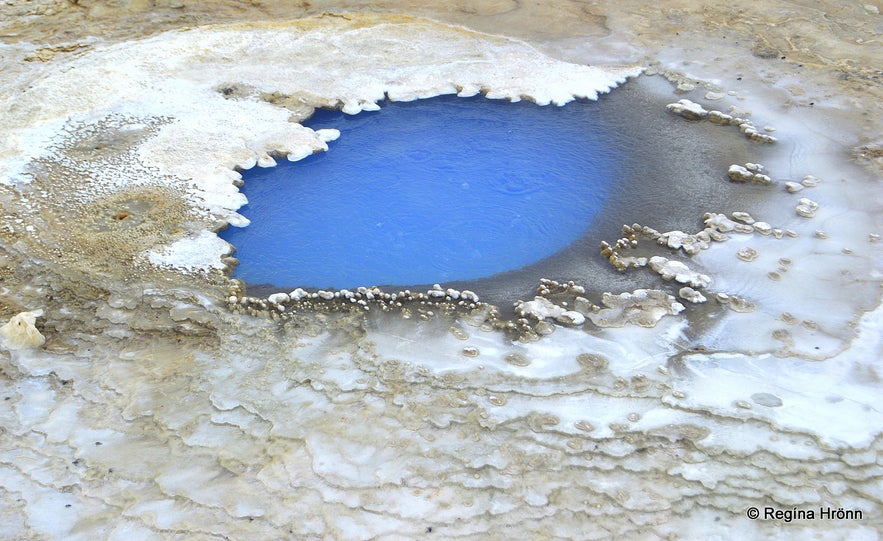
Fagrihver hot spring
Fagrihver - Lovely Hot Spring is one of the most beautiful hot springs I have seen in my country. The most beautiful white geyserite surrounds this lovely little azure blue eye. Isn't it lovely?
And Öskurhólshver - Roaring Mound is also a very distinctive hot spring, as sounds are coming from it, as if it is roaring. It used to whistle, but has now stopped and only roars. You can hear it roaring in my video below.
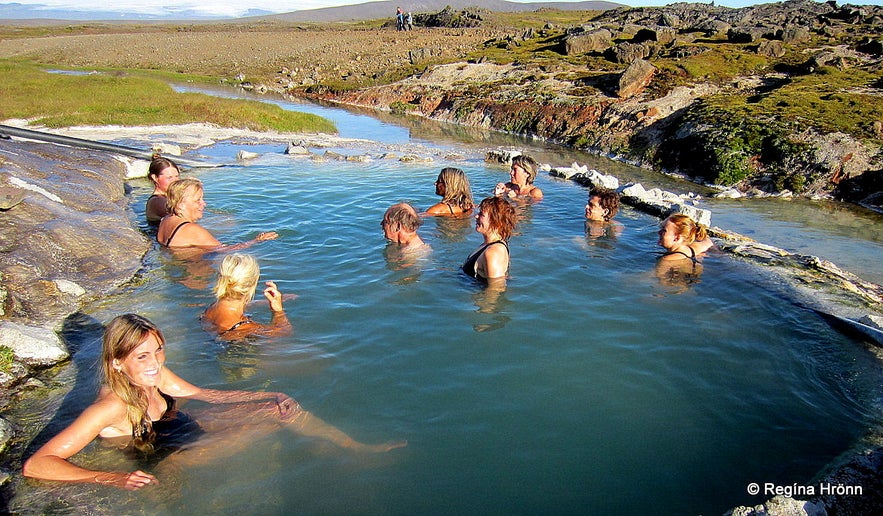
The lovely hot pool at Hveravellir
At Hveravell,ir you will find a warm pool in the river. It is so lovely soaking in the heated pool at Hveravellir, just heavenly. But be prepared to get undressed and dressed, wearing only a towel.
At least that has been the situation when I have visited Hveravellir; there were no changing rooms.
See also my travel blog with a lot more photos and videos, and stories about the outlaws Fjalla-Eyvindur and Halla:
Hveravellir - the beautiful Oasis in the Highland of Iceland
Landmannalaugar
Landmannalaugar, the Pearl of the Central Highland of Iceland, is a fantastic area to visit.
Here you will see the most beautiful rhyolite mountains and hills and mountains in a multitude of colours.
While hiking in Grænagil Canyon and up to Mt. Brennisteinsalda, we passed a small geothermal area.
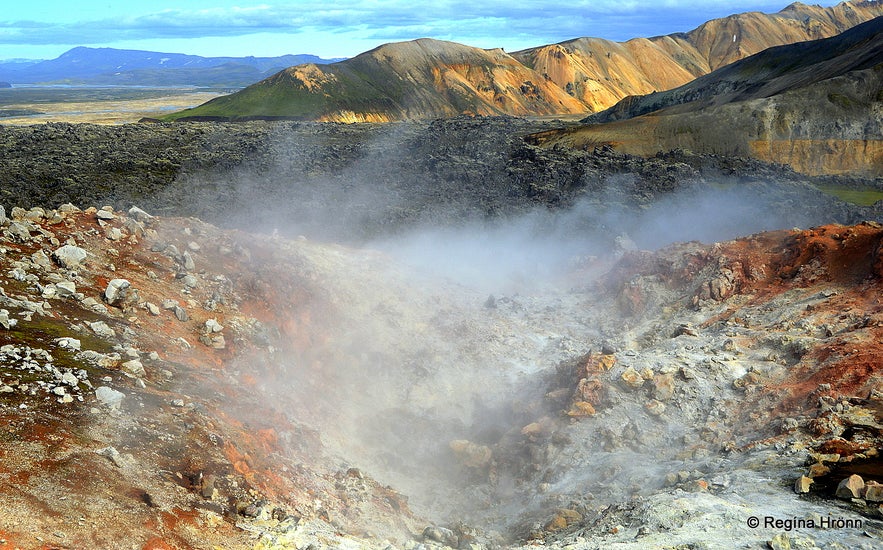
Just before we reached the colourful mountain, the obnoxious smell of sulphur filled the air. It came from a big mud pool on the hill.
Ever since I got sulfur poisoning at the Hverir geothermal area in North Iceland, this pungent smell makes me nauseous.
See also my travel blog:
Landmannalaugar, the Pearl of the Central Highland of Iceland.
5. Geothermal Areas in the Westfjords of Iceland
Reykjanes in the Westfjords of Iceland
Kolahver hot spring
While I stayed at the Reykjanes hotel in the Westfjords of Iceland, I visited the geothermal area behind the hotel, next to the sea.
The hotel has one of the best swimming pools I have visited in Iceland: the long, hot swimming pool Reykjaneslaug (50 x 12.5 metres).
Guests at the hotel can use the swimming pool for free, but there is an entrance fee for other visitors.
The old swimming pool behind the hotel - Gamla laugin
By the geothermal area, you will find an old swimming pool, "Gamla laugin," where swimming lessons took place before the swimming pool by the hotel was erected. The swimming pool by the geothermal area is no longer in use.
This old swimming pool was built in 1889, but there was an even older turf pool erected in 1837. There are no traces of that swimming pool, but the molten swimming pool was most likely built on the ruins of the older one (Ref. Rafhlaðan - Fornleifar Reykjanesi)
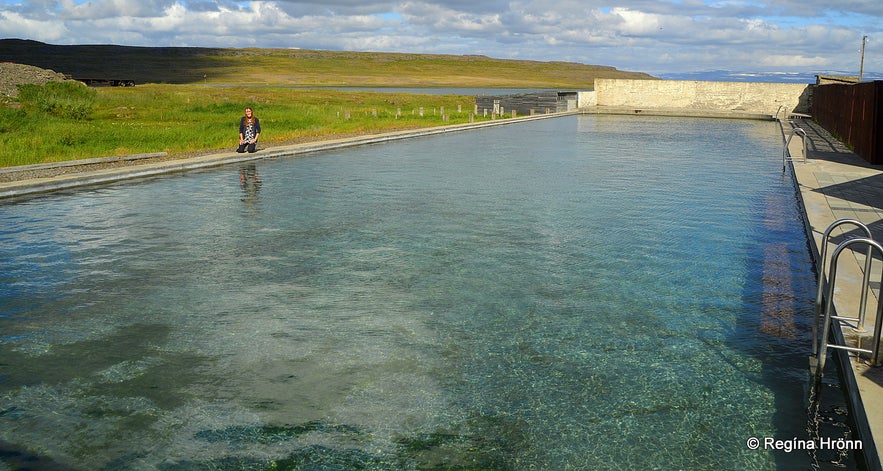
The lovely swimming pool at Reykjanes by the hotel
For further reading about the hot pools in the Westfjords of Iceland, check out my travel blogs:
A lovely Visit to Reykjanes in the Westfjords of Iceland
Hot Pools in the Westfjords of Iceland - a Selection of the Natural Pools I have visited.
Reykhólar Geothermal Area
Einireykir hot spring
I stayed in the lovely Reykhólar in the southern part of the Westfjord region for three days and explored the area.
While walking to Lómatjörn pond - the Pond of the Loom, I passed by a small geothermal area.
The name of the hot spring in my photo above is Einireykir or Eini Reykir.
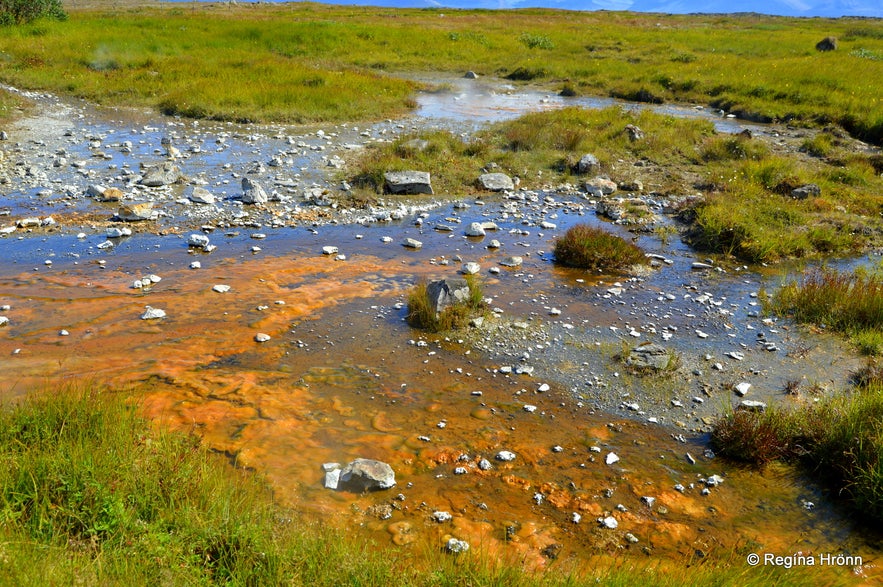
The purple flower in my photo below is called vatnamynta in Icelandic (Mentha aquatica) and is preserved.
It can only be found in three places in Iceland. A German gardener cultivated flowers at Reykjanes by Djúp (see my previous tip).
He brought the vatnamynta to Iceland, sent it to Svanshóll in Bjarnafjörður at Strandir, and here to Reykhólar. This flower can only be seen in these 3 locations in the Westfjords of Iceland.
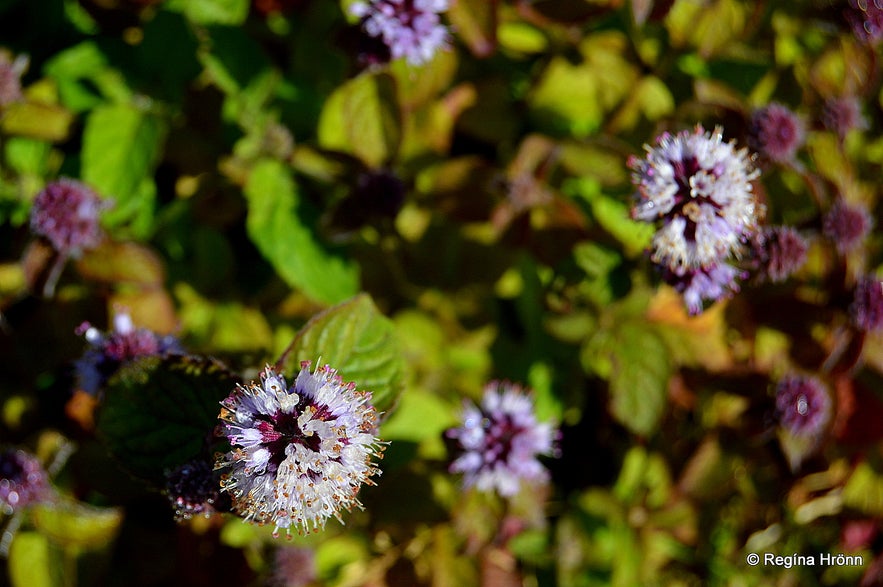
Vatnamynta - Mentha aquatica
See also my travel blogs about this lovely area:
Three days of fun at Reykhólar in the Westfjords of Iceland - Part 1
Strandir - Krossneshverar Geothermal Area
Krossneshverir geothermal area at Strandir
In the remote Strandir in the Westfjords of Iceland, you will find a small geothermal area, Krossneshverar hot springs, and mud pools.
On the other side of the road, you will find a lovely swimming pool, Krossneslaug, to which geothermal water from the geothermal area is directed.
Krossneslaug is sometimes called the best-kept secret in the Westfjords.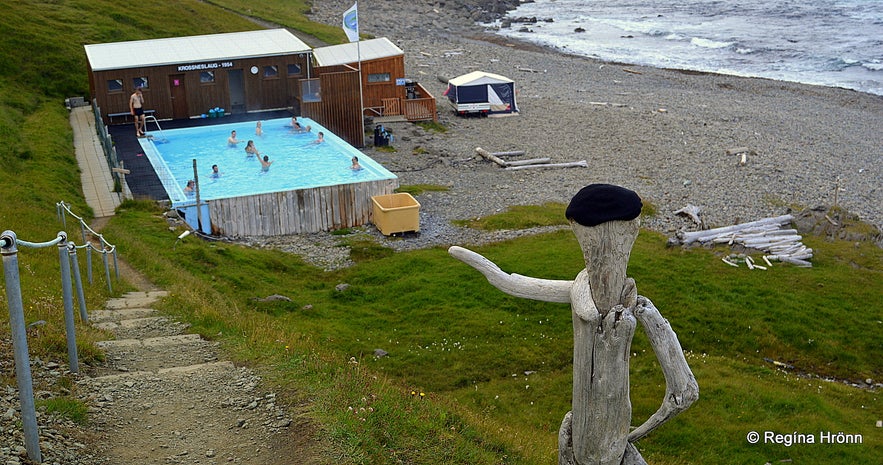
Krossneslaug swimming pool
The reason why it is called this name is that you cannot go any further by car in the Strandir area than to Krossneslaug (well, a couple of km further on, but then you will have to turn the car around). It is lovely soaking in this warm swimming pool at Laugarvík cove right next to the North Atlantic sea.
Icelandic folklore tells us about the sorcerer and poet Jón lærði Guðmundsson signing a contract with the devil in the 17th century to channel the water from the geothermal springs into the nearby farm - without success. I haven't been able to find a source for this folklore, though.
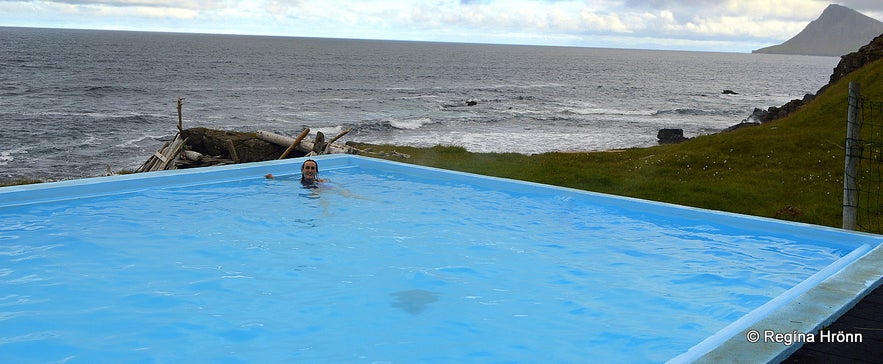
Soaking in the Krossneslaug swimming pool
You can read more about Strandir in my travel blog:
The remote Strandir in the Westfjords of Iceland - Stillness & Sorcery.
6. Other Geothermal Areas Which I Have Visited on my Travels in Iceland
Skíðaskálinn í Hveradölum
Hveradalir geothermal area, South Iceland
You will find a small geothermal area by Skíðaskálinn í Hveradölum, the Skiing Lodge in Hveradalir, Hot Spring Valley.
A ski lodge was built here in 1935, and I have very fond memories of it from when I was a little girl, when I stayed at the inn on several occasions.
That ski lodge, sadly, burnt down in 1991, and a new one was built in 1992.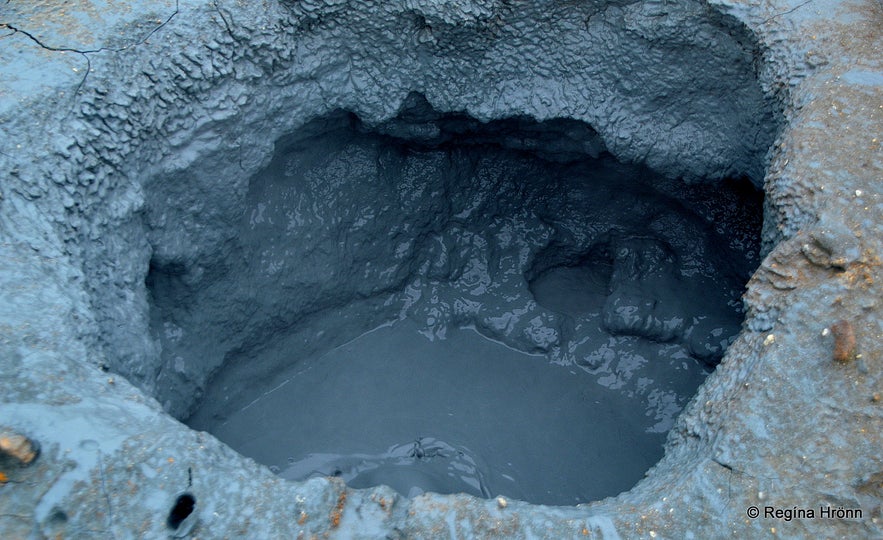
A bubbling mud pool in Hveradalir valley
This area is amongst the most active geothermal areas in Iceland, and just a stone's throw away from Hveradalir valley, you will find the largest geothermal power station in Iceland, Hellisheiðarvirkjun.
When we were little, we were always told about the dangers of the geothermal areas, and I especially remember being told never to go too close to these mud pools at Hveradalir.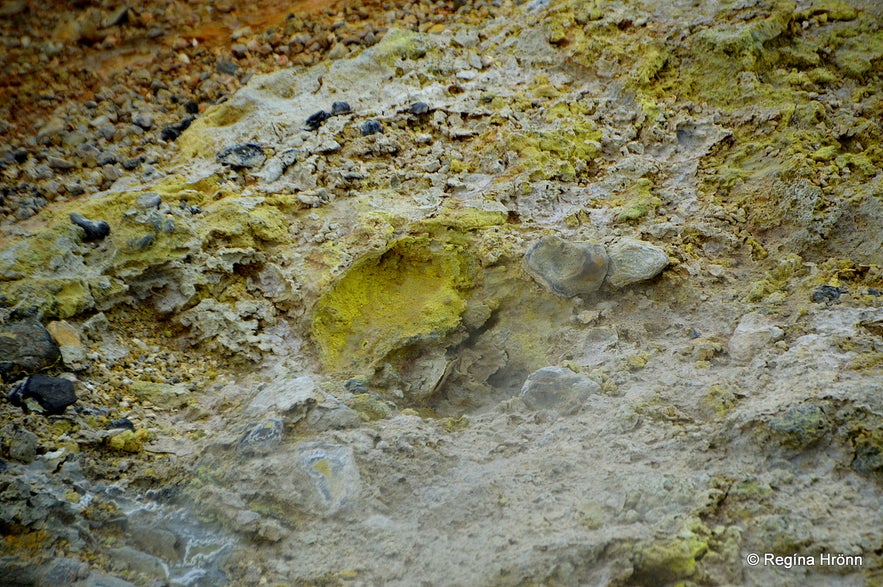
Hveradalir geothermal area
This is just how we locals are brought up, and it is common knowledge here that geothermal areas are dangerous. That is why we never take any risks here.
I have noticed that some of our foreign visitors don't respect the dangers of these scorching geothermal areas.
Many accidents have happened in Iceland's geothermal areas, so be extra careful and never cross the boundaries.
In some regions, there are no boundaries, so be careful and never go too close or step on the mud.
We never know where there are boiling springs and mud pools beneath a thin crust of mud.
Gamla Laugin - The Secret Lagoon
Boling an egg in the Vaðmálahver hot spring
Upcountry in south Iceland, you will find the oldest swimming pool in Iceland - Gamla laugin a.k.a the Secret Lagoon, built in 1891. By the pool, there is a small geothermal area, and on one of the occasions when I visited the lagoon, I boiled eggs for supper - in the hot-spring Vaðmálahver!
I had joined a guided tour of the Golden Circle, and at the end of the day tour, we got to soak in the Secret Lagoon. After a lovely soak and a massage, we were given a fishing rod and a net in which to boil eggs in the hot spring. Cooking eggs in hot springs takes eight minutes.
The name of the hot spring, Vaðmálahver, stems from clothes being washed in this particular hot spring in the olden days.
Steam coming from the geothermal area by Gamla laugin - the Secret Lagoon
The water at the Secret Lagoon is 38-40° Celsius (100° Fahrenheit). It is lovely visiting this lagoon all year round.
In the summertime, you will get almost endless daylight, and in the wintertime, you have a good chance of seeing the Northern Lights while soaking in the hot lagoon.
There are several other hot springs by Gamla laugin, and here you will find Litli-Geysir, which erupts approximately at a 5-minute interval.
Be extra careful in this geothermal area, as even though it doesn't look dangerous, the hot springs are extremely hot and boiling.
In October 2016, a tourist stepped inside the boundaries of the closed-off geothermal area and got extreme burn wounds when he fell into a hot spring :(
See also my travel blogs:
The Golden Circle and Floating in the Secret Lagoon at Flúðir in South Iceland, and
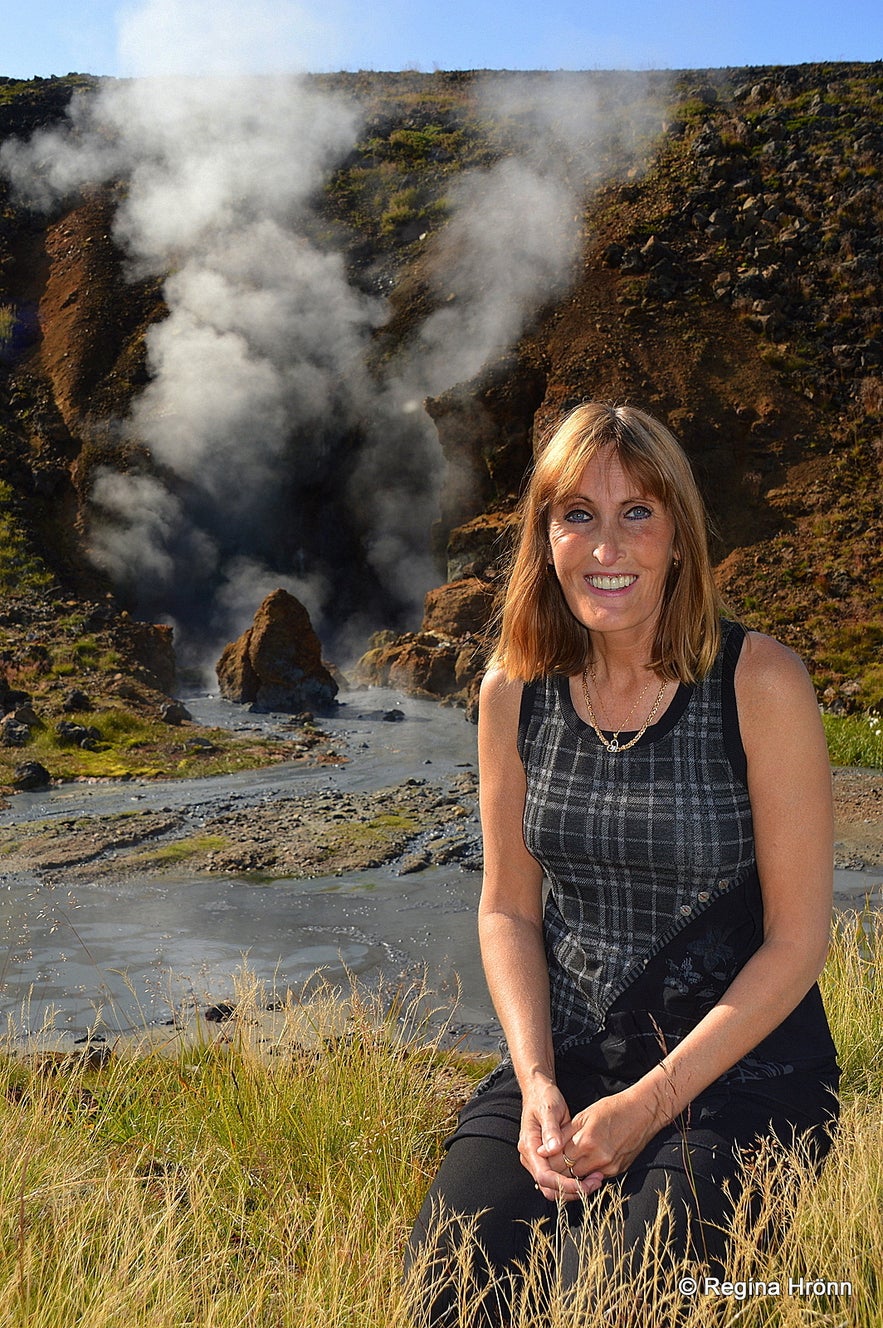
Now, this is my take on Iceland's geothermal areas. There are many more geothermal areas that I have shown you in my travel blogs, but these are the ones I love visiting.
I just recently added this travel blog about the geothermal area by Ölkelduháls: The colourful Geothermal Areas by Mt. Ölkelduhnúkur and Ölkelduháls in South Iceland.
I hope you have enjoyed reading my travel blog, which is a part of the series of my favourite locations in Iceland :)
A Local's Favourite Volcanic Craters in Iceland
A Local's Favourite Caves in Iceland
Have a lovely time in Iceland :)

